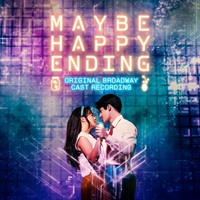 Original Broadway Cast, 2025 (Ghostlight)
Original Broadway Cast, 2025 (Ghostlight)  (4.5 / 5) While Maybe Happy Ending’s story revolves around two humanoids known as Helperbots, the score is anything but robotic. In fact, the music by Will Aronson is decidedly passionate. Aronson uses light jazz melodies, paired with Hue Park’s simple and effective lyrics, to create a beautifully melancholy mood. With a book by Aronson and Park, this musical centers around Oliver and Claire, who are being stored in separate rooms in a retirement home for older Helperbot models. We first meet Oliver (played by Darren Criss) in the song “The World Within My Room,” as he moves through his daily routine in his solitary space with only his plant, named Hwaboon, for companionship, plus plenty of jazz records and magazines on hand for listening and reading. (Oliver’s erstwhile owner, James, loved that genre of music). The jazz songs featured on the records that Oliver plays are primarily sung by cast member Dez Duron, who croons pleasantly throughout the album. Claire, played by Helen J Shen, is a newer, more human-like model of Helperbot, though still considered obsolete. She intrudes on Oliver’s solitude one day when she knocks on his door asking to borrow his charger, and soon, the two of them decide to journey out of their storage center and see the world — Oliver hoping to find his onetime owner, James, Claire wanting to see fireflies for the first time. Criss plays Oliver with a stubborn optimism, and his singing is perfectly suited for the score. Shen gets more feisty character moments, but she also shows a sensitive side when she sings about loss in “What I Learned From People.” The pair’s quirky charm is captured wonderfully in the duet “The Rainy Day We Met,” in which they create a fictional, romantic backstory for themselves in case they are questioned on their adventure. The instrumentals in Maybe Happy Ending should also be mentioned, as they make for some of the most effective tracks on the album. “Why Love” is a melody repeated throughout the score, but it never sounds sweeter than when arranged for solo piano, and one can almost see the magic of the fireflies during the orchestral piece “Chasing Fireflies.” The concept of this show, the cast, and the music all combine to tell a moving story of love, loss, and — most surprisingly — mortality. — Forrest Hutchinson
(4.5 / 5) While Maybe Happy Ending’s story revolves around two humanoids known as Helperbots, the score is anything but robotic. In fact, the music by Will Aronson is decidedly passionate. Aronson uses light jazz melodies, paired with Hue Park’s simple and effective lyrics, to create a beautifully melancholy mood. With a book by Aronson and Park, this musical centers around Oliver and Claire, who are being stored in separate rooms in a retirement home for older Helperbot models. We first meet Oliver (played by Darren Criss) in the song “The World Within My Room,” as he moves through his daily routine in his solitary space with only his plant, named Hwaboon, for companionship, plus plenty of jazz records and magazines on hand for listening and reading. (Oliver’s erstwhile owner, James, loved that genre of music). The jazz songs featured on the records that Oliver plays are primarily sung by cast member Dez Duron, who croons pleasantly throughout the album. Claire, played by Helen J Shen, is a newer, more human-like model of Helperbot, though still considered obsolete. She intrudes on Oliver’s solitude one day when she knocks on his door asking to borrow his charger, and soon, the two of them decide to journey out of their storage center and see the world — Oliver hoping to find his onetime owner, James, Claire wanting to see fireflies for the first time. Criss plays Oliver with a stubborn optimism, and his singing is perfectly suited for the score. Shen gets more feisty character moments, but she also shows a sensitive side when she sings about loss in “What I Learned From People.” The pair’s quirky charm is captured wonderfully in the duet “The Rainy Day We Met,” in which they create a fictional, romantic backstory for themselves in case they are questioned on their adventure. The instrumentals in Maybe Happy Ending should also be mentioned, as they make for some of the most effective tracks on the album. “Why Love” is a melody repeated throughout the score, but it never sounds sweeter than when arranged for solo piano, and one can almost see the magic of the fireflies during the orchestral piece “Chasing Fireflies.” The concept of this show, the cast, and the music all combine to tell a moving story of love, loss, and — most surprisingly — mortality. — Forrest Hutchinson
Category Archives: L-M
Lempicka
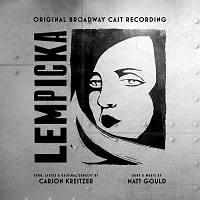 Original Broadway Cast, 2024 (Sony Masterworks Broadway)
Original Broadway Cast, 2024 (Sony Masterworks Broadway)  (1 / 5) Fans hailed Eden Espinosa’s return to Broadway in Lempicka and fawned over pre-released songs from the score, such as “Woman Is,”’ that showed off her powerful vocal instrument. Unfortunately, the show was a dud — an unfocused and unpleasant musical that appeared to be far more interested in the soap opera aspects of the title character’s life than her art. First-time listeners to this cast recording might be taken aback by the techno music and harsh orchestrations used in the overture, especially if they have any background knowledge about the show’s subject: Polish painter Tamara de Lempicka, whose most notable works were completed in the 1920s and ’30s in the Art Deco style, of which she was a pioneer. Composer Matt Gould seems to have written electronic music with rhythmic, focused beats for this score as a way of reflecting the hard-edged style of Lempicka’s art. Perhaps this is justifiable for the numbers in which Lempicka is learning to paint and developing her style, but as the show’s plot proceeds, and both her marriage and her extra-marital affair begin to fall apart, the emotional turmoil is accompanied by jarringly upbeat music more fit for a dance club. Espinosa impressively belts her way through the mediocre material, and two other pluses of the album are the textured, beautiful voices of Amber Iman and Andrew Samonsky as, respectively, Lempicka’s muse/lover and her husband, the latter doing his best with the show’s most poorly written character. These three share a love triangle that takes up most of the focus in the overstuffed plot and score. Lempicka closed very quickly on Broadway, and this recording seems unlikely to become a treasured cast album of a flop. A final note: Beth Leavel in the role of The Baroness gets one song here — the show’s 11 o’clock number, “Just This Way” — and she makes the most of it. — Forrest Hutchinson
(1 / 5) Fans hailed Eden Espinosa’s return to Broadway in Lempicka and fawned over pre-released songs from the score, such as “Woman Is,”’ that showed off her powerful vocal instrument. Unfortunately, the show was a dud — an unfocused and unpleasant musical that appeared to be far more interested in the soap opera aspects of the title character’s life than her art. First-time listeners to this cast recording might be taken aback by the techno music and harsh orchestrations used in the overture, especially if they have any background knowledge about the show’s subject: Polish painter Tamara de Lempicka, whose most notable works were completed in the 1920s and ’30s in the Art Deco style, of which she was a pioneer. Composer Matt Gould seems to have written electronic music with rhythmic, focused beats for this score as a way of reflecting the hard-edged style of Lempicka’s art. Perhaps this is justifiable for the numbers in which Lempicka is learning to paint and developing her style, but as the show’s plot proceeds, and both her marriage and her extra-marital affair begin to fall apart, the emotional turmoil is accompanied by jarringly upbeat music more fit for a dance club. Espinosa impressively belts her way through the mediocre material, and two other pluses of the album are the textured, beautiful voices of Amber Iman and Andrew Samonsky as, respectively, Lempicka’s muse/lover and her husband, the latter doing his best with the show’s most poorly written character. These three share a love triangle that takes up most of the focus in the overstuffed plot and score. Lempicka closed very quickly on Broadway, and this recording seems unlikely to become a treasured cast album of a flop. A final note: Beth Leavel in the role of The Baroness gets one song here — the show’s 11 o’clock number, “Just This Way” — and she makes the most of it. — Forrest Hutchinson
Little Women
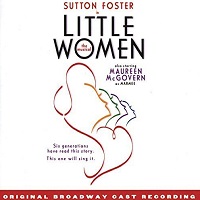 Original Broadway Cast, 2005 (Ghostlight) No stars; not recommended. Among the most distressing of all musicals are those adaptations of classic literature that are very poorly crafted but achieve some significant degree of success regardless, because the characters and storytelling of the source material are so beloved as to ensure the musical will garner fans who are not sensitive to the fact that the score is second-, third-, or even fourth-rate. One prime example is Little Women, with music by Jason Howland, lyrics by Mindi Dickstein, and a book by Allan Knee. Although this show inspired by Louisa May Alcott’s novel had only a four-month run on Broadway, it has been frequently produced regionally on both the professional and amateur levels — never mind that the score is serviceable at best and deplorable at worst. Howland’s music is generic, derivative, and exhibits no sense of period style, while Dickstein’s lyrics are prosaic and obvious. One of the most egregious songs to be found here is “Astonishing,” so ineptly written that the one-word title, repeated many times throughout the lyric, is annoyingly set with the accent on the wrong syllable (the final one, rather than the second one). In the role of Jo, Sutton Foster offers renditions of this and other songs marked by the sort of extremely unpleasant, pinched, high belting that tends to cause young female audiences to scream approval but is nevertheless a blight on the musical theater. The lovely voices of Danny Gurwin as Laurie, John Weitzer as John Brooke, and especially the great Maureen McGovern as Marmee provide some respite from all that’s going on around them, but given the generally very low quality of the material that they too are given to sing, their contributions are not enough to make this recording worthwhile. The same can be said for the singers heard here in the roles of the other “little women” — Amy McAlexander as Amy, Megan McGinnis as Beth, Jenny Powers as Meg — who fail to make much of an impression because they have comparatively little to do. According to the nervy marketing blurb on the cast album cover, “Six generations have read this story. This one will sing it.” As was the case with the infamous Cats catch phrase “Now and forever,” one wonders if that’s meant as a promise, a threat, or an ultimatum. — Michael Portantiere
Original Broadway Cast, 2005 (Ghostlight) No stars; not recommended. Among the most distressing of all musicals are those adaptations of classic literature that are very poorly crafted but achieve some significant degree of success regardless, because the characters and storytelling of the source material are so beloved as to ensure the musical will garner fans who are not sensitive to the fact that the score is second-, third-, or even fourth-rate. One prime example is Little Women, with music by Jason Howland, lyrics by Mindi Dickstein, and a book by Allan Knee. Although this show inspired by Louisa May Alcott’s novel had only a four-month run on Broadway, it has been frequently produced regionally on both the professional and amateur levels — never mind that the score is serviceable at best and deplorable at worst. Howland’s music is generic, derivative, and exhibits no sense of period style, while Dickstein’s lyrics are prosaic and obvious. One of the most egregious songs to be found here is “Astonishing,” so ineptly written that the one-word title, repeated many times throughout the lyric, is annoyingly set with the accent on the wrong syllable (the final one, rather than the second one). In the role of Jo, Sutton Foster offers renditions of this and other songs marked by the sort of extremely unpleasant, pinched, high belting that tends to cause young female audiences to scream approval but is nevertheless a blight on the musical theater. The lovely voices of Danny Gurwin as Laurie, John Weitzer as John Brooke, and especially the great Maureen McGovern as Marmee provide some respite from all that’s going on around them, but given the generally very low quality of the material that they too are given to sing, their contributions are not enough to make this recording worthwhile. The same can be said for the singers heard here in the roles of the other “little women” — Amy McAlexander as Amy, Megan McGinnis as Beth, Jenny Powers as Meg — who fail to make much of an impression because they have comparatively little to do. According to the nervy marketing blurb on the cast album cover, “Six generations have read this story. This one will sing it.” As was the case with the infamous Cats catch phrase “Now and forever,” one wonders if that’s meant as a promise, a threat, or an ultimatum. — Michael Portantiere
Man in the Moon
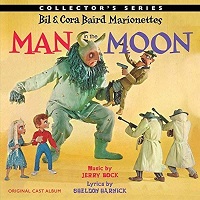 Original Broadway Cast, 1963 (Golden Records/no CD)
Original Broadway Cast, 1963 (Golden Records/no CD)  (2 / 5) The puppets of Bil and Cora Baird were all over early television, as well as being featured in the Broadway musical Flahooley and the film version of The Sound of Music. In the 1960s, Bil Baird attempted a series of theatrical musicals for kids. Some of them were performed in his Greenwich Village jewel box theater, but Man in the Moon actually played on Broadway. The director was Gerald Freedman, the book was written by Arthur Burns (based on a story by Baird), and the songs were by composer Jerry Bock and lyricist Sheldon Harnick. They wrote five numbers for this one-act musical, all of them modest but delightful. (The second acts of Baird’s shows were puppet revues.) In one of the songs, “I Got an Itch,” the gangster-villain sings about having “an itch for a rich, ripe rube I can rob” and tells us that “When night-time comes a-stealing, so do I.” The plot centers on a young boy who goes to the moon by riding a moonbeam but doesn’t realize that gangsters on the lam are right behind him. The gangsters are defeated, and everyone leaves happy — except for Bock and Harnick’s numerous fans, who can’t help thinking about all of the other wonderful shows they might have written as a team if The Rothschilds hadn’t marked their last time working together. — David Wolf
(2 / 5) The puppets of Bil and Cora Baird were all over early television, as well as being featured in the Broadway musical Flahooley and the film version of The Sound of Music. In the 1960s, Bil Baird attempted a series of theatrical musicals for kids. Some of them were performed in his Greenwich Village jewel box theater, but Man in the Moon actually played on Broadway. The director was Gerald Freedman, the book was written by Arthur Burns (based on a story by Baird), and the songs were by composer Jerry Bock and lyricist Sheldon Harnick. They wrote five numbers for this one-act musical, all of them modest but delightful. (The second acts of Baird’s shows were puppet revues.) In one of the songs, “I Got an Itch,” the gangster-villain sings about having “an itch for a rich, ripe rube I can rob” and tells us that “When night-time comes a-stealing, so do I.” The plot centers on a young boy who goes to the moon by riding a moonbeam but doesn’t realize that gangsters on the lam are right behind him. The gangsters are defeated, and everyone leaves happy — except for Bock and Harnick’s numerous fans, who can’t help thinking about all of the other wonderful shows they might have written as a team if The Rothschilds hadn’t marked their last time working together. — David Wolf
The Madwoman of Central Park West
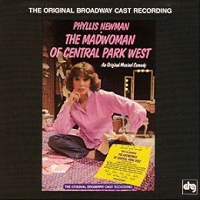 Original Broadway Cast, 1990 (DRG)
Original Broadway Cast, 1990 (DRG)  (3 / 5) This show was a good time, but the cast recording — only 37 minutes in length — is of little help in bringing back the experience for those who saw it, or giving a good idea of it for those who didn’t. The Madwoman of Central Park West is about Phyllis Newman trying to get her life together. It begins as she drags herself out of bed, singing “Up! Up! Up!”, written for an unfinished Skin of our Teeth adaptation by Leonard Bernstein, Betty Comden, and Adolph Green (Newman’s husband). Other numbers included are “What Makes Me Love Him?” (from the Jerry Bock-Sheldon Harnick-Jerome Coopersmith musical The Apple Tree), Ed Kleban’s irresistible song “Better,” and a very funny version of the Bruce Sussman-Jack Feldman-Barry Manilow hit “Copacabana.” But the one item that makes this album essential is “Don’t Laugh,” written by Mary Rodgers and Martin Charnin for Hot Spot (which starred Judy Holliday), then doctored on the road by Rodgers’ friend Stephen Sondheim, who added the wonderful “show me” sections: “Show me a glass of water, I’ll show you a soggy dress / Show me a tube of toothpaste, I’ll show you a mess / Show me a fresh-laid sidewalk and guess where my footprints are / Show me a fire hydrant, I’ll show you my car.” (Note: There was a TV adaptation of The Madwoman of Central Park West, so you may be able to seek that out and see it for yourself.) — David Wolf
(3 / 5) This show was a good time, but the cast recording — only 37 minutes in length — is of little help in bringing back the experience for those who saw it, or giving a good idea of it for those who didn’t. The Madwoman of Central Park West is about Phyllis Newman trying to get her life together. It begins as she drags herself out of bed, singing “Up! Up! Up!”, written for an unfinished Skin of our Teeth adaptation by Leonard Bernstein, Betty Comden, and Adolph Green (Newman’s husband). Other numbers included are “What Makes Me Love Him?” (from the Jerry Bock-Sheldon Harnick-Jerome Coopersmith musical The Apple Tree), Ed Kleban’s irresistible song “Better,” and a very funny version of the Bruce Sussman-Jack Feldman-Barry Manilow hit “Copacabana.” But the one item that makes this album essential is “Don’t Laugh,” written by Mary Rodgers and Martin Charnin for Hot Spot (which starred Judy Holliday), then doctored on the road by Rodgers’ friend Stephen Sondheim, who added the wonderful “show me” sections: “Show me a glass of water, I’ll show you a soggy dress / Show me a tube of toothpaste, I’ll show you a mess / Show me a fresh-laid sidewalk and guess where my footprints are / Show me a fire hydrant, I’ll show you my car.” (Note: There was a TV adaptation of The Madwoman of Central Park West, so you may be able to seek that out and see it for yourself.) — David Wolf
Make a Wish
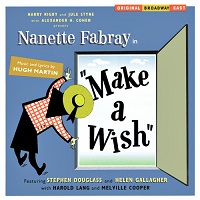 Original Broadway Cast, 1951 (RCA/Sepia)
Original Broadway Cast, 1951 (RCA/Sepia)  (4 / 5) A spiffy overture, a swell opening chorus (“The Tour Must Go On”), then out comes our heroine with an even better character-establishing number, “I Wanna Be Good ‘n’ Bad.” In Hugh Martin’s musical adaptation of Ferenc Molnar’s The Good Fairy, Fabray is a Parisian orphan who breaks away from the orphanage and runs smack into an aspiring barrister, played by Stephen Douglass. The two stars are strictly A-list. As the second couple, Helen Gallagher and Harold Lang play a bickering nightclub duo. The cast album is generous with song-setting dialogue, and Martin’s score is up-tempo and unpretentious, offering lots of chances for this gifted quartet to shine. The ballads are also choice, particularly Fabray’s “What I Was Warned About” and Douglass’s “When Does This Feeling Go Away?” Yet even with a Preston Sturges book and show-stopping Gower Champion dances (the music for one of the ballets is included here), this musical was not a hit — and you can hear why. Halfway through the recording, there’s a silly march (“Paris, France”), and most of what follows sounds like filler. By the time Fabray, Lang, and Gallagher are slamming across “Take Me Back to Texas With You” (“My poor eyes will get all watery / When I see Monsieur Gene Aut-e-ry”), you’ll realize what a hodge-podge the score is, its ambience careening uneasily between Paris and Passaic. Martin’s vocal arrangements, so much fun when he’s serving other composers, just sound garish when he’s working his own stuff into the ground, as in “That Face.” Still, the four leads are tops, and the gold in this mixed bag outweighs the dross. — Marc Miller
(4 / 5) A spiffy overture, a swell opening chorus (“The Tour Must Go On”), then out comes our heroine with an even better character-establishing number, “I Wanna Be Good ‘n’ Bad.” In Hugh Martin’s musical adaptation of Ferenc Molnar’s The Good Fairy, Fabray is a Parisian orphan who breaks away from the orphanage and runs smack into an aspiring barrister, played by Stephen Douglass. The two stars are strictly A-list. As the second couple, Helen Gallagher and Harold Lang play a bickering nightclub duo. The cast album is generous with song-setting dialogue, and Martin’s score is up-tempo and unpretentious, offering lots of chances for this gifted quartet to shine. The ballads are also choice, particularly Fabray’s “What I Was Warned About” and Douglass’s “When Does This Feeling Go Away?” Yet even with a Preston Sturges book and show-stopping Gower Champion dances (the music for one of the ballets is included here), this musical was not a hit — and you can hear why. Halfway through the recording, there’s a silly march (“Paris, France”), and most of what follows sounds like filler. By the time Fabray, Lang, and Gallagher are slamming across “Take Me Back to Texas With You” (“My poor eyes will get all watery / When I see Monsieur Gene Aut-e-ry”), you’ll realize what a hodge-podge the score is, its ambience careening uneasily between Paris and Passaic. Martin’s vocal arrangements, so much fun when he’s serving other composers, just sound garish when he’s working his own stuff into the ground, as in “That Face.” Still, the four leads are tops, and the gold in this mixed bag outweighs the dross. — Marc Miller
Mr. Saturday Night
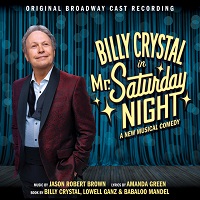 Original Broadway Cast, 2022 (Craft Recordings)
Original Broadway Cast, 2022 (Craft Recordings)  (2 / 5) The highlight of many a Golden Age musicals is the “11 o’clock number.” Mr. Saturday Night, a Golden Age pastiche, has at least four of them — without earning even one. This show was written as a vehicle for Billy Crystal, star of the movie that served as its source material. It tells the story of aging comedian Buddy Young, Jr., who is reduced to playing nursing homes until an “in memoriam” section of an awards show lists him as dead and inspires a career renaissance. This is a character we’re supposed to fall in love with, but lyricist Amanda Green (here writing in the style of her father Adolph) and composer Jason Robert Brown make it hard to do so. Right from his first song, “A Little Joy,” it’s clear that Buddy is a bitter, nasty man — beaten down by bad breaks, sure, but spiteful, and funny only in his anger. Shoshana Bean as his recovering alcoholic daughter expresses her frustration with him in the show’s third song, “There’s A Chance,” compounding the case against him. The essential problem here is that nothing about Buddy redeems him — at least, nothing that’s expressed on the cast album. That proviso is necessary because some of the funniest moments in the show were contained in the book, co-written by Crystal with Lowell Ganz and Babaloo Mandel. For this reviewer, the highlight was a montage in which Buddy humiliated himself on various game shows, meanwhile endearing himself to the audience. Also, as heard on the album, Mr. Saturday Night can feel disjointed; an unexpectedly long flashback sequence (which, due to a lack of interstitial dialogue on the recording, may not even be obvious as a flashback to listeners) does include one of the score’s few truly funny songs, “At Farber’s,” but still seems like an excuse to draw out the skimpy plot. Two of the strongest numbers come towards the end: “Broken,” acted beautifully by David Paymer as Buddy’s long-suffering brother, which adds some variety to the overall sound of the score; and “My Wonderful Pain in the Ass,” a genuinely sweet duet between Buddy and his wife, Elaine (Randy Graff), that’s reminiscent of “Do You Love Me?” from Fiddler on the Roof. Overall, though, Shoshana Bean’s songs prove to be the highlights of the show. In the finale, “Stick Around,” Bean as Buddy’s daughter tells the audience to “stick around — though you sometimes may wonder why.” When you’re listening to this recording and the better songs aren’t playing, those words may seem very well chosen. — Charles Kirsch
(2 / 5) The highlight of many a Golden Age musicals is the “11 o’clock number.” Mr. Saturday Night, a Golden Age pastiche, has at least four of them — without earning even one. This show was written as a vehicle for Billy Crystal, star of the movie that served as its source material. It tells the story of aging comedian Buddy Young, Jr., who is reduced to playing nursing homes until an “in memoriam” section of an awards show lists him as dead and inspires a career renaissance. This is a character we’re supposed to fall in love with, but lyricist Amanda Green (here writing in the style of her father Adolph) and composer Jason Robert Brown make it hard to do so. Right from his first song, “A Little Joy,” it’s clear that Buddy is a bitter, nasty man — beaten down by bad breaks, sure, but spiteful, and funny only in his anger. Shoshana Bean as his recovering alcoholic daughter expresses her frustration with him in the show’s third song, “There’s A Chance,” compounding the case against him. The essential problem here is that nothing about Buddy redeems him — at least, nothing that’s expressed on the cast album. That proviso is necessary because some of the funniest moments in the show were contained in the book, co-written by Crystal with Lowell Ganz and Babaloo Mandel. For this reviewer, the highlight was a montage in which Buddy humiliated himself on various game shows, meanwhile endearing himself to the audience. Also, as heard on the album, Mr. Saturday Night can feel disjointed; an unexpectedly long flashback sequence (which, due to a lack of interstitial dialogue on the recording, may not even be obvious as a flashback to listeners) does include one of the score’s few truly funny songs, “At Farber’s,” but still seems like an excuse to draw out the skimpy plot. Two of the strongest numbers come towards the end: “Broken,” acted beautifully by David Paymer as Buddy’s long-suffering brother, which adds some variety to the overall sound of the score; and “My Wonderful Pain in the Ass,” a genuinely sweet duet between Buddy and his wife, Elaine (Randy Graff), that’s reminiscent of “Do You Love Me?” from Fiddler on the Roof. Overall, though, Shoshana Bean’s songs prove to be the highlights of the show. In the finale, “Stick Around,” Bean as Buddy’s daughter tells the audience to “stick around — though you sometimes may wonder why.” When you’re listening to this recording and the better songs aren’t playing, those words may seem very well chosen. — Charles KirschMrs. Doubtfire
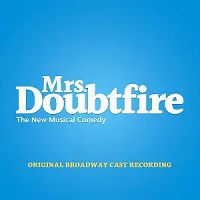 Original Broadway Cast, 2022 (Sh-K-Boom)
Original Broadway Cast, 2022 (Sh-K-Boom)  (2 / 5) A 1993 film comedy in which Robin Williams as divorced dad Daniel cons his way back into his children’s lives by disguising himself as a Scottish nanny, Mrs. Doubtfire seemed to have the bones for a delightful stage musical adaptation. But despite some spunky performances and Ethan Popp’s lively orchestrations, the cast album basically distills what was disappointing about the final product that audiences saw onstage when the show, with a score by Wayne and Karey Kirkpatrick, finally opened on Broadway in 2021 after a long pandemic delay. While the Kirkpatricks’ first show, Something Rotten, grounded its playful musical vernacular in references to the Broadway catalog and, occasionally, the Renaissance, Mrs. Doubtfire’s score stylistically hopscotches from rock to jazz to flamenco without much sense of dramatic purpose or consistent tone. Leading the cast, Rob McClure and Jenn Gambatese are too often hampered by sleepy, self-serious ballads (“I Want To Be There,” “Let Go”) that contain watery platitudes such as “Time can heal, all is not lost / As long as there is love.” The extended production numbers, which seemed designed to pad out the show’s runtime on Broadway — including “Make Me A Woman” (the makeover), “Easy Peasy” (a cooking tutorial), and “You’ve Been Playing With Fire” (a dream sequence, featuring pyrotechnic vocals from Charity Angél Dawson) — feel even less necessary when stripped of their staging. One exception is a comic confrontation (“Big Fat No”) between McClure as Mrs. D. and Mark Evans as the doting gym rat who’s courting Daniel’s ex; the pseudo-bossa-nova groove of this number is appealingly silly, there are some clever tongue-in-cheek ensemble asides, and it’s pretty much the only sequence where McClure actually gets to sing as Mrs. Doubtfire rather than as Daniel. The best song in the score goes to the kids: “What the Hell,” a punchy pop dissection of the impact of divorce, spotlights Avery Sell and Jake Ryan Flynn as Daniel’s youngest children. But it’s the sardonic, aching voice of Analise Scarpaci, playing the eldest daughter, Lydia, that soars highest on this recording. Scarpaci imbues Lydia with an emotional intelligence that lends much-needed specificity to the opening number, “What’s Wrong With This Picture,” and a gloopy second-act duet with McClure, “Just Pretend.” [Note: As it happens, Scarpaci released her own album of original music, Pathetic Little Dreamer, in 2021 while waiting for Mrs Doubtfire to reopen. She’s even better served by her own writing. ] — Dan Rubins
(2 / 5) A 1993 film comedy in which Robin Williams as divorced dad Daniel cons his way back into his children’s lives by disguising himself as a Scottish nanny, Mrs. Doubtfire seemed to have the bones for a delightful stage musical adaptation. But despite some spunky performances and Ethan Popp’s lively orchestrations, the cast album basically distills what was disappointing about the final product that audiences saw onstage when the show, with a score by Wayne and Karey Kirkpatrick, finally opened on Broadway in 2021 after a long pandemic delay. While the Kirkpatricks’ first show, Something Rotten, grounded its playful musical vernacular in references to the Broadway catalog and, occasionally, the Renaissance, Mrs. Doubtfire’s score stylistically hopscotches from rock to jazz to flamenco without much sense of dramatic purpose or consistent tone. Leading the cast, Rob McClure and Jenn Gambatese are too often hampered by sleepy, self-serious ballads (“I Want To Be There,” “Let Go”) that contain watery platitudes such as “Time can heal, all is not lost / As long as there is love.” The extended production numbers, which seemed designed to pad out the show’s runtime on Broadway — including “Make Me A Woman” (the makeover), “Easy Peasy” (a cooking tutorial), and “You’ve Been Playing With Fire” (a dream sequence, featuring pyrotechnic vocals from Charity Angél Dawson) — feel even less necessary when stripped of their staging. One exception is a comic confrontation (“Big Fat No”) between McClure as Mrs. D. and Mark Evans as the doting gym rat who’s courting Daniel’s ex; the pseudo-bossa-nova groove of this number is appealingly silly, there are some clever tongue-in-cheek ensemble asides, and it’s pretty much the only sequence where McClure actually gets to sing as Mrs. Doubtfire rather than as Daniel. The best song in the score goes to the kids: “What the Hell,” a punchy pop dissection of the impact of divorce, spotlights Avery Sell and Jake Ryan Flynn as Daniel’s youngest children. But it’s the sardonic, aching voice of Analise Scarpaci, playing the eldest daughter, Lydia, that soars highest on this recording. Scarpaci imbues Lydia with an emotional intelligence that lends much-needed specificity to the opening number, “What’s Wrong With This Picture,” and a gloopy second-act duet with McClure, “Just Pretend.” [Note: As it happens, Scarpaci released her own album of original music, Pathetic Little Dreamer, in 2021 while waiting for Mrs Doubtfire to reopen. She’s even better served by her own writing. ] — Dan RubinsMoulin Rouge!
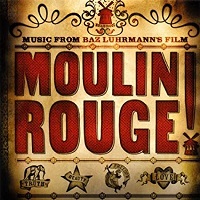 Music From Baz Luhrmann’s Film, 2001 (Interscope)
Music From Baz Luhrmann’s Film, 2001 (Interscope)  (1 / 5) Here is the soundtrack recording (partly; see below) of what might be described as a movie musical that’s perfect for the ADD generation in terms of its plot (based on well-worn tropes from several famous works, most notably the operas La Bohème and La Traviata and their literary source material) as well as its “jukebox” score (an overstuffed basket of pop hits from the last half of the 20th century). Also geared toward those who suffer from attention deficit disorder is the ridiculously frenetic editing of the film as directed by Baz Luhrmann. Presumably, at least some people who enjoyed the musical performances in Moulin Rouge! might wish to own the soundtrack album if only to experience the songs without having to endure the over-editing of the film itself. But caveat emptor, as the album titled Moulin Rouge! Music from Baz Luhrmann’s Film does not, for the most part, feature performances from the movie, instead offering covers of those covers. To cite only one major example, this collection starts with “Nature Boy” sung not by John Leguizamo (who plays Toulouse-Lautrec in the film and sings the song to open it) but instead by David Bowie. A highlight of the album is a performance that is, indeed, heard in the movie: Ewan McGregor’s lovely, romantic rendition of Elton John and Bernie Taupin’s beautiful “Your Song.” But fans of the film who want audio-only versions of the performances in it will need to additionally seek out the album Moulin Rouge! 2, which includes such items as Nicole Kidman’s “Sparkling Diamonds” (a silly mash-up of “Diamonds Are a Girl’s Best Friend” and “Material Girl”); Jim Broadbent, Richard Roxburgh, et al. having their way with “Like a Virgin” (yes, another Madonna song); and the Can-Can pastiche “The Pitch (Spectacular Spectacular).” There are also excerpts from the film’s background score by Craig Armstrong, for anyone who might care a whit about that. – Michael Portantiere
(1 / 5) Here is the soundtrack recording (partly; see below) of what might be described as a movie musical that’s perfect for the ADD generation in terms of its plot (based on well-worn tropes from several famous works, most notably the operas La Bohème and La Traviata and their literary source material) as well as its “jukebox” score (an overstuffed basket of pop hits from the last half of the 20th century). Also geared toward those who suffer from attention deficit disorder is the ridiculously frenetic editing of the film as directed by Baz Luhrmann. Presumably, at least some people who enjoyed the musical performances in Moulin Rouge! might wish to own the soundtrack album if only to experience the songs without having to endure the over-editing of the film itself. But caveat emptor, as the album titled Moulin Rouge! Music from Baz Luhrmann’s Film does not, for the most part, feature performances from the movie, instead offering covers of those covers. To cite only one major example, this collection starts with “Nature Boy” sung not by John Leguizamo (who plays Toulouse-Lautrec in the film and sings the song to open it) but instead by David Bowie. A highlight of the album is a performance that is, indeed, heard in the movie: Ewan McGregor’s lovely, romantic rendition of Elton John and Bernie Taupin’s beautiful “Your Song.” But fans of the film who want audio-only versions of the performances in it will need to additionally seek out the album Moulin Rouge! 2, which includes such items as Nicole Kidman’s “Sparkling Diamonds” (a silly mash-up of “Diamonds Are a Girl’s Best Friend” and “Material Girl”); Jim Broadbent, Richard Roxburgh, et al. having their way with “Like a Virgin” (yes, another Madonna song); and the Can-Can pastiche “The Pitch (Spectacular Spectacular).” There are also excerpts from the film’s background score by Craig Armstrong, for anyone who might care a whit about that. – Michael Portantiere
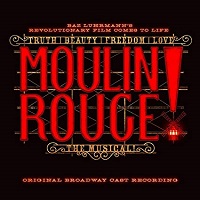 Original Broadway Cast, 2019 (RCA)
Original Broadway Cast, 2019 (RCA)  (1 / 5) People who loved Baz Luhrmann’s Moulin Rouge! on the screen won’t necessarily have similar affection for the Broadway musical based on the movie. There are many differences, including much of the score (songs first made famous by Lady Gaga, Britney Spears, the Eurtyhmics, etc. are now included as others have been jettisoned) and some of the story elements and dialogue. Those who enjoyed the seemingly fueled-by-crack editing of the movie will, of course, miss that element in the stage adaptation, while others who abhorred and deplored all that relentless, insanely quick cutting will appreciate being able to make their own decisions about what to focus on when seeing the show, and for how long. As for the cast recording, at least you’ll know exactly what to expect when/if you get your hands on it: a truckload of pop hits, or fragments of same, performed by Karen Olivo as Satine, Aaron Tveit as Christian, Danny Burstein as Harold Zidler, Robyn Hurder as Nini, Tam Mutu as The Duke of Monroth, Sahr Ngaujah as Toulouse-Lautrec, and the other original cast members who sang them on stage at the Al Hirschfeld Theatre before and, in some cases, after the show was forced to suspend performances due to the COVID-19 crisis of 2020. (Cast album listeners have the additional assurance that they will, indeed, hear Satine’s songs delivered by Olivo, who was frequently absent during the eight months or so that Moulin Rouge! ran prior to its closure at the onset of the pandemic.) Although Tveit tends to come across as bland on stage, his strong, clear, unaffected tenor voice is a pleasure to hear on this album, and Burstein is always a vivid presence. The musical supervisor here is Justin Levine, with Cian McCarthy as conductor and Matt Stine as Music Producer — that last credit an unusual one for a Broadway show, or at least it used to be. – M.P.
(1 / 5) People who loved Baz Luhrmann’s Moulin Rouge! on the screen won’t necessarily have similar affection for the Broadway musical based on the movie. There are many differences, including much of the score (songs first made famous by Lady Gaga, Britney Spears, the Eurtyhmics, etc. are now included as others have been jettisoned) and some of the story elements and dialogue. Those who enjoyed the seemingly fueled-by-crack editing of the movie will, of course, miss that element in the stage adaptation, while others who abhorred and deplored all that relentless, insanely quick cutting will appreciate being able to make their own decisions about what to focus on when seeing the show, and for how long. As for the cast recording, at least you’ll know exactly what to expect when/if you get your hands on it: a truckload of pop hits, or fragments of same, performed by Karen Olivo as Satine, Aaron Tveit as Christian, Danny Burstein as Harold Zidler, Robyn Hurder as Nini, Tam Mutu as The Duke of Monroth, Sahr Ngaujah as Toulouse-Lautrec, and the other original cast members who sang them on stage at the Al Hirschfeld Theatre before and, in some cases, after the show was forced to suspend performances due to the COVID-19 crisis of 2020. (Cast album listeners have the additional assurance that they will, indeed, hear Satine’s songs delivered by Olivo, who was frequently absent during the eight months or so that Moulin Rouge! ran prior to its closure at the onset of the pandemic.) Although Tveit tends to come across as bland on stage, his strong, clear, unaffected tenor voice is a pleasure to hear on this album, and Burstein is always a vivid presence. The musical supervisor here is Justin Levine, with Cian McCarthy as conductor and Matt Stine as Music Producer — that last credit an unusual one for a Broadway show, or at least it used to be. – M.P.
Mary Poppins
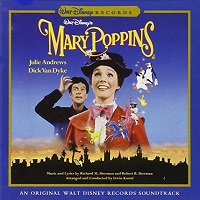 Film Soundtrack, 1964 (Buena Vista/Walt Disney Records)
Film Soundtrack, 1964 (Buena Vista/Walt Disney Records)  (5 / 5) Disney’s Mary Poppins has been beloved from the moment audiences first saw the film in 1964, permeating our culture and becoming a hallmark for family friendly entertainment. Even if you’re a neophyte to the story of the mysterious and magical nanny who teaches a British family the importance of love, fun, and compassion, you’ll understand why the film has attained classic status with just one listen to this soundtrack. The score, by brothers Richard M. and Robert B. Sherman, remains timeless, with many of the songs long ago having achieved the status of internationally recognized standards: “A Spoonful of Sugar,” “ Jolly Holiday,” “Supercalifragilisticxpialidocious,” et al. Indeed, it’s difficult to think of another original movie musical that has produced as many great songs — and even the lesser-known ones, such as “Sister Suffragette” and “The Perfect Nanny,” are clever and charming enough to avoid being the sort of “skippable” tracks that even some of the best Broadway cast albums contain. As the action of the film is set in London in the early 1900s, Irwin Kostal’s arrangements pay fitting homage to Edwardian music halls, and his incidental music (included on deluxe editions of the soundtrack) craftily rearranges the Sherman Brothers’ compositions to feel like new pieces. As for the cast, they remain unbeatable. Julie Andrews made one of the most smashing screen debuts in history as Mary Poppins, a role that showcases her immense range, from comedic vaudevillian (“Supercalifragilisticxpialidocious”) to intimate chanteuse (“Feed the Birds”). By her side is Dick Van Dyke, effervescent as Bert, a jack-of-all-trades and loyal friend to Mary and her charges, Jane and Michael Banks. Though Van Dyke’s Cockney accent is legendarily awful, it really doesn’t matter at this point, as its humorous inauthenticity has taken on its own charming, nostalgic quality. In short, this soundtrack is a perfect companion to the landmark film. — Matt Koplik
(5 / 5) Disney’s Mary Poppins has been beloved from the moment audiences first saw the film in 1964, permeating our culture and becoming a hallmark for family friendly entertainment. Even if you’re a neophyte to the story of the mysterious and magical nanny who teaches a British family the importance of love, fun, and compassion, you’ll understand why the film has attained classic status with just one listen to this soundtrack. The score, by brothers Richard M. and Robert B. Sherman, remains timeless, with many of the songs long ago having achieved the status of internationally recognized standards: “A Spoonful of Sugar,” “ Jolly Holiday,” “Supercalifragilisticxpialidocious,” et al. Indeed, it’s difficult to think of another original movie musical that has produced as many great songs — and even the lesser-known ones, such as “Sister Suffragette” and “The Perfect Nanny,” are clever and charming enough to avoid being the sort of “skippable” tracks that even some of the best Broadway cast albums contain. As the action of the film is set in London in the early 1900s, Irwin Kostal’s arrangements pay fitting homage to Edwardian music halls, and his incidental music (included on deluxe editions of the soundtrack) craftily rearranges the Sherman Brothers’ compositions to feel like new pieces. As for the cast, they remain unbeatable. Julie Andrews made one of the most smashing screen debuts in history as Mary Poppins, a role that showcases her immense range, from comedic vaudevillian (“Supercalifragilisticxpialidocious”) to intimate chanteuse (“Feed the Birds”). By her side is Dick Van Dyke, effervescent as Bert, a jack-of-all-trades and loyal friend to Mary and her charges, Jane and Michael Banks. Though Van Dyke’s Cockney accent is legendarily awful, it really doesn’t matter at this point, as its humorous inauthenticity has taken on its own charming, nostalgic quality. In short, this soundtrack is a perfect companion to the landmark film. — Matt Koplik
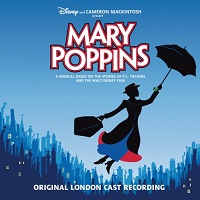 Original London Cast, 2005 (Walt Disney Records)
Original London Cast, 2005 (Walt Disney Records)  (4 / 5) Although Disney’s Mary Poppins is a beloved classic, author P.L. Travers, who wrote the book series on which the film was based, famously hated it. For this reason, Travers initially refused any further adaptations of her stories about the magical nanny while she was alive — that is, until producer Cameron Mackintosh persuaded her to grant him the rights to create a stage musical. Travers acquiesced on the condition that the entire creative team for the project would be British and would exclude everyone involved in the Disney movie. Mackintosh kept his word, to a certain extent: Although he collaborated with Disney Theatrical Productions so that the show could contain the most famous songs from the film, Mackintosh did bring on an entirely British team, including West End regulars George Stiles and Anthony Drewe to create new songs, expanding the score and giving the work a drier tone. While the final result isn’t as ebullient as the film, it’s still charming. The work of Stiles and Drewe is enjoyable in its own right — and, partly thanks to William David Brohn’s intelligent orchestrations, the score feels like a unified work, even if it does have two sets of writers. As heard on the cast album, the supporting players are a bit of a mixed bag: A bold and unleashed Rosemary Ashe stands out as the show’s villain, Miss Andrew (a character added for the musical), in “Brimstone and Treacle,” while Linzi Hatley’s Mrs. Banks is miscast, her modern-style vocalization at odds with the character’s new song, “Being Mrs. Banks” (a replacement for the film’s more entertaining “Sister Suffragette”). Gavin Lee is a wonderful Bert, and Charlotte Spencer and Harry Stott give intelligent performances as Jane and Michael, rewritten here as far brattier versions than the characters in the movie. But the biggest perk of the album is Oliver Award winner Laura Michelle Kelly’s performance as Mary Poppins. Charming, elegant, and ethereal, Kelly swims through the score with her captivating voice, elevating new songs such as “Practically Perfect” while bringing new life to “A Spoonful of Sugar” and other classics. If this recording isn’t the monumental achievement of the soundtrack, with Kelly leading the charge, it stands on its own. — M.K.
(4 / 5) Although Disney’s Mary Poppins is a beloved classic, author P.L. Travers, who wrote the book series on which the film was based, famously hated it. For this reason, Travers initially refused any further adaptations of her stories about the magical nanny while she was alive — that is, until producer Cameron Mackintosh persuaded her to grant him the rights to create a stage musical. Travers acquiesced on the condition that the entire creative team for the project would be British and would exclude everyone involved in the Disney movie. Mackintosh kept his word, to a certain extent: Although he collaborated with Disney Theatrical Productions so that the show could contain the most famous songs from the film, Mackintosh did bring on an entirely British team, including West End regulars George Stiles and Anthony Drewe to create new songs, expanding the score and giving the work a drier tone. While the final result isn’t as ebullient as the film, it’s still charming. The work of Stiles and Drewe is enjoyable in its own right — and, partly thanks to William David Brohn’s intelligent orchestrations, the score feels like a unified work, even if it does have two sets of writers. As heard on the cast album, the supporting players are a bit of a mixed bag: A bold and unleashed Rosemary Ashe stands out as the show’s villain, Miss Andrew (a character added for the musical), in “Brimstone and Treacle,” while Linzi Hatley’s Mrs. Banks is miscast, her modern-style vocalization at odds with the character’s new song, “Being Mrs. Banks” (a replacement for the film’s more entertaining “Sister Suffragette”). Gavin Lee is a wonderful Bert, and Charlotte Spencer and Harry Stott give intelligent performances as Jane and Michael, rewritten here as far brattier versions than the characters in the movie. But the biggest perk of the album is Oliver Award winner Laura Michelle Kelly’s performance as Mary Poppins. Charming, elegant, and ethereal, Kelly swims through the score with her captivating voice, elevating new songs such as “Practically Perfect” while bringing new life to “A Spoonful of Sugar” and other classics. If this recording isn’t the monumental achievement of the soundtrack, with Kelly leading the charge, it stands on its own. — M.K.
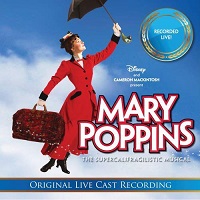 Australian Cast, 2011 (Walt Disney Records)
Australian Cast, 2011 (Walt Disney Records)  (2 / 5) This live recording of a performance of the Australian production of Mary Poppins preserves all the revisions to the show that were made after the London cast recording was released. (No cast album of the Broadway production was issued.) While there are some tweaks in arrangements and lyrics, the most notable change is the replacement of “Temper, Temper,” a nightmarish fever dream in which Jane and Michael are reprimanded by the toys they abuse in their nursery, with the less sinister “Playing the Game.” Neither song is particularly noteworthy, but “Temper, Temper” has a bit more bite to it and would probably have been given Travers’ seal of approval over “Playing the Game.” Other than that, this album isn’t much different from the London recording in terms of material. William David Brohn’s orchestrations perhaps sound a little richer here, and the cast brings a good deal of energy to their performances. The album is billed as “live,” but the performance and the engineering are clean enough that it sounds as if it were recorded in a studio, aside from some applause at the end of certain numbers. Some casting perks here are Matt Lee as an entertaining Bert and Marina Prior as an improvement over Linzi Hatley in the role of Mrs. Banks. The rest of the cast members are either equal or inferior to their London counterparts, with Judi Connelli lacking the necessary vocal heft for “Brimstone and Treacle.” Sadly, although Verity Hunt-Ballard as Mary Poppins has a pleasant voice, she can’t match Laura Michelle Kelly’s luxurious soprano, and her characterization is no better than presentable and professional. This album may please first-time listeners, but there is a greater deal of fun to be had from the previous two recordings. — M.K.
(2 / 5) This live recording of a performance of the Australian production of Mary Poppins preserves all the revisions to the show that were made after the London cast recording was released. (No cast album of the Broadway production was issued.) While there are some tweaks in arrangements and lyrics, the most notable change is the replacement of “Temper, Temper,” a nightmarish fever dream in which Jane and Michael are reprimanded by the toys they abuse in their nursery, with the less sinister “Playing the Game.” Neither song is particularly noteworthy, but “Temper, Temper” has a bit more bite to it and would probably have been given Travers’ seal of approval over “Playing the Game.” Other than that, this album isn’t much different from the London recording in terms of material. William David Brohn’s orchestrations perhaps sound a little richer here, and the cast brings a good deal of energy to their performances. The album is billed as “live,” but the performance and the engineering are clean enough that it sounds as if it were recorded in a studio, aside from some applause at the end of certain numbers. Some casting perks here are Matt Lee as an entertaining Bert and Marina Prior as an improvement over Linzi Hatley in the role of Mrs. Banks. The rest of the cast members are either equal or inferior to their London counterparts, with Judi Connelli lacking the necessary vocal heft for “Brimstone and Treacle.” Sadly, although Verity Hunt-Ballard as Mary Poppins has a pleasant voice, she can’t match Laura Michelle Kelly’s luxurious soprano, and her characterization is no better than presentable and professional. This album may please first-time listeners, but there is a greater deal of fun to be had from the previous two recordings. — M.K.
Mean Girls
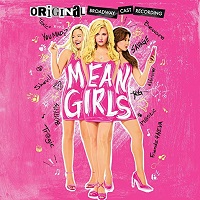 Original Broadway Cast, 2018 (Atlantic)
Original Broadway Cast, 2018 (Atlantic)  (3 / 5) Mean Girls has been a major staple in pop culture ever since the film was released in 2004. With instantly quotable dialogue and numerous iconic moments, the movie is so beloved that it was only a matter of time before the property made its way to the stage as a splashy musical. The plot is similar to Heathers, if a little more family friendly in its delivery: Having spent most of her young life in Africa with her zoologist parents, Cady Heron is thrust into a suburban U.S. high school, where she’s quickly lured in by the appeal of the school’s popular clique, The Plastics , and its glamorous and calculating leader, Regina George (Taylor Louderman). With legendary comedy writer Tina Fey adapting her original screenplay, her husband Jeff Richmond composing the music, and Tony nominee Nell Benjamin providing the lyrics, expectations for the musical were high, but the final product proved to be a mixed bag. Rather than stick to one genre of music, Richmond chose to incorporate golden-age Broadway, rock, bubble gum pop, salsa, and more to reflect the different social cliques of high school. This isn’t a bad idea in theory, and the mixing of different musical styles has certainly been done successfully in many previous shows. But even though John Clancy’s versatile orchestrations accommodate the various genres, they often clash with each other, and many of the songs lack the sort of structure that would allow them to build to a satisfying conclusion. Meanwhile, Benjamin’s lyrics are clever and well crafted but rarely have the bite of Fey’s dialogue (though little of that is presented on the recording). Still, for the most part, the album is an enjoyable listening experience thanks to Richmond’s talent for creating catchy ear worms, as well as the performances of exceptionally talented cast, who do a commendable job of making their mark on characters so strongly associated with the film portrayals. Most successful are Louderman as queen bee Regina and Grey Hansen as the comfortably flamboyant Damien; she revels in Regina’s viciousness, often singing in a low whisper before crescendoing to a commanding high belt, as in the vengeful “World Burn,” while he gives the album Broadway sparkle with his natural comedic timing and brassy vocals. However, it’s Kate Rockwell as Karen, the ditzy member of the Plastics, who has the best song in the score, “Sexy” — a paean to achieving female empowerment by dressing up in skimpy Halloween costumes. Here, Richmond brings musical theater know-how to the bubble gum music, and Benjamin’s lyrics are genuinely funny (“This is modern feminism talkin’ / I expect to run the world in shoes I cannot walk in”). In this song, Mean Girls the musical briefly reaches the same satirical heights as its source material. — Matt Koplik
(3 / 5) Mean Girls has been a major staple in pop culture ever since the film was released in 2004. With instantly quotable dialogue and numerous iconic moments, the movie is so beloved that it was only a matter of time before the property made its way to the stage as a splashy musical. The plot is similar to Heathers, if a little more family friendly in its delivery: Having spent most of her young life in Africa with her zoologist parents, Cady Heron is thrust into a suburban U.S. high school, where she’s quickly lured in by the appeal of the school’s popular clique, The Plastics , and its glamorous and calculating leader, Regina George (Taylor Louderman). With legendary comedy writer Tina Fey adapting her original screenplay, her husband Jeff Richmond composing the music, and Tony nominee Nell Benjamin providing the lyrics, expectations for the musical were high, but the final product proved to be a mixed bag. Rather than stick to one genre of music, Richmond chose to incorporate golden-age Broadway, rock, bubble gum pop, salsa, and more to reflect the different social cliques of high school. This isn’t a bad idea in theory, and the mixing of different musical styles has certainly been done successfully in many previous shows. But even though John Clancy’s versatile orchestrations accommodate the various genres, they often clash with each other, and many of the songs lack the sort of structure that would allow them to build to a satisfying conclusion. Meanwhile, Benjamin’s lyrics are clever and well crafted but rarely have the bite of Fey’s dialogue (though little of that is presented on the recording). Still, for the most part, the album is an enjoyable listening experience thanks to Richmond’s talent for creating catchy ear worms, as well as the performances of exceptionally talented cast, who do a commendable job of making their mark on characters so strongly associated with the film portrayals. Most successful are Louderman as queen bee Regina and Grey Hansen as the comfortably flamboyant Damien; she revels in Regina’s viciousness, often singing in a low whisper before crescendoing to a commanding high belt, as in the vengeful “World Burn,” while he gives the album Broadway sparkle with his natural comedic timing and brassy vocals. However, it’s Kate Rockwell as Karen, the ditzy member of the Plastics, who has the best song in the score, “Sexy” — a paean to achieving female empowerment by dressing up in skimpy Halloween costumes. Here, Richmond brings musical theater know-how to the bubble gum music, and Benjamin’s lyrics are genuinely funny (“This is modern feminism talkin’ / I expect to run the world in shoes I cannot walk in”). In this song, Mean Girls the musical briefly reaches the same satirical heights as its source material. — Matt Koplik
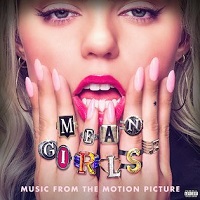 Motion Picture Soundtrack, 2024 (Interscope)
Motion Picture Soundtrack, 2024 (Interscope)  (1 / 5) After the Mean Girls musical had a successful run on Broadway, Tina Fey and her team reassembled to bring the property back to the screen. Their efforts yielded mixed results. While the new movie is harmless, it can’t decide whether it’s an actual screen version of the stage musical or just a Gen-Z update of the 2004 original. The soundtrack is even more flavorless; while the score’s main problem on Broadway was having too many musical personalities, the movie iteration suffers from a lack of personality completely. Although most of the biggest duds from the stage show were cut, what remains is hardly thrilling, as Jeff Richmond has rearranged many of the songs to play like pop hits. For example, “Stupid with Love” and “Someone Gets Hurt” were not that great to begin with, but now they have all the appeal of dead fish. The colorless arrangements and heavy auto-tune also weaken songs that were once highlights of the Broadway recording, such as the clever “Sexy,” stripping them of their individuality and bite. If the new cast, packed with up-and-coming TV/film actors, is game, only a few of them succeed here. Reneé Rapp steps in as Regina, after having taken over for Taylor Louderman in the Broadway production. Her icy tone and “too cool for school” attitude properly fit the Queen Bee role, and her expansive voice helps turn Regina’s vengeful “World Burn” into one of the few bright spots of the recording. Auli’i Cravalho, as scheming outsider Janis, is the other MVP. She does what she can with the cutesy anthem “I’d Rather Be Me,” and she shares with Jacquel Spivey as Damian the best cut on the album: “Revenge Party,” which tracks the duo’s scheme with heroine Cody to take down Regina, is the only song on the soundtrack with a dramatic motor. Unfortunately, sitting right in the center of everything is Angourie Rice as Cady. Rice has a likable presence in the film, but her voice is just too thin and wispy to carry any weight, making all of her songs easily skippable. — M.K.
(1 / 5) After the Mean Girls musical had a successful run on Broadway, Tina Fey and her team reassembled to bring the property back to the screen. Their efforts yielded mixed results. While the new movie is harmless, it can’t decide whether it’s an actual screen version of the stage musical or just a Gen-Z update of the 2004 original. The soundtrack is even more flavorless; while the score’s main problem on Broadway was having too many musical personalities, the movie iteration suffers from a lack of personality completely. Although most of the biggest duds from the stage show were cut, what remains is hardly thrilling, as Jeff Richmond has rearranged many of the songs to play like pop hits. For example, “Stupid with Love” and “Someone Gets Hurt” were not that great to begin with, but now they have all the appeal of dead fish. The colorless arrangements and heavy auto-tune also weaken songs that were once highlights of the Broadway recording, such as the clever “Sexy,” stripping them of their individuality and bite. If the new cast, packed with up-and-coming TV/film actors, is game, only a few of them succeed here. Reneé Rapp steps in as Regina, after having taken over for Taylor Louderman in the Broadway production. Her icy tone and “too cool for school” attitude properly fit the Queen Bee role, and her expansive voice helps turn Regina’s vengeful “World Burn” into one of the few bright spots of the recording. Auli’i Cravalho, as scheming outsider Janis, is the other MVP. She does what she can with the cutesy anthem “I’d Rather Be Me,” and she shares with Jacquel Spivey as Damian the best cut on the album: “Revenge Party,” which tracks the duo’s scheme with heroine Cody to take down Regina, is the only song on the soundtrack with a dramatic motor. Unfortunately, sitting right in the center of everything is Angourie Rice as Cady. Rice has a likable presence in the film, but her voice is just too thin and wispy to carry any weight, making all of her songs easily skippable. — M.K.
A Minister’s Wife
 Original Off-Broadway Cast (PS Classics, 2011)
Original Off-Broadway Cast (PS Classics, 2011)  (3 / 5) Bernard Shaw’s plays do not easily adapt into musicals; My Fair Lady took Lerner and Loewe two tries, and only worked when they opened up the action beyond Shaw’s scenes. The opposite approach is taken in A Minister’s Wife, based on Shaw’s Candida (1897). Composer Joshua Schmidt, lyricist Jan Levy Tranen, and librettist Austin Pendleton, following a concept of director Michael Halberstam, concentrated rather than expanded the narrative. They jettisoned a key character (Candida’s crude father) and focused on the domestic triangle of fiery minister James Morell (Marc Kudisch); his lovely wife, Candida (Kate Fry); and Eugene Marchbanks (Bobby Steggert), a young poet whom Morell has rescued from the streets. Liz Baltes as Morell’s secretary, Prossy, and Drew Gehling as his earnest curate, Lexy, complete the outstanding cast. Kudisch’s opening number, “Sermon,” conveys the basic tenets of Christian Socialism, but an unsettling dissonance in the music hints that while Morell claims “we must learn to live for each other,” perhaps he needs to listen to his own words. Steggert is terrific as Marchbanks: his poet is frail, self-pitying, whiny, and yet confident in his passion, especially in “Shallops and Scrubbing Brushes” and the “Second Preaching Match.” Fry gets the benefit of the most melodious parts of Schmidt’s score, yet she wallops both men in the blunt “Spoiled From the Cradle.” Kudisch’s minister progresses from poised to angry to fearful as his inner flaws are revealed. The whole piece is wrapped up in the gorgeous “Into the Night,” as the cast ponders the future. Tranen’s lyrics are Shavian to the core, with many lifted directly from the play; Schimidt’s orchestrations for a chamber orchestra do a good job of advancing the subtext, with Laura Bontrager’s cello and Pasquale Laurino’s violin especially exquisite. Like Schmidt’s Adding Machine, this is an unusual, challenging show. One could wish for more distinct songs, rather than so many extended scenes set to music. But A Minister’s Wife is a small gem in itself. — Laura Frankos
(3 / 5) Bernard Shaw’s plays do not easily adapt into musicals; My Fair Lady took Lerner and Loewe two tries, and only worked when they opened up the action beyond Shaw’s scenes. The opposite approach is taken in A Minister’s Wife, based on Shaw’s Candida (1897). Composer Joshua Schmidt, lyricist Jan Levy Tranen, and librettist Austin Pendleton, following a concept of director Michael Halberstam, concentrated rather than expanded the narrative. They jettisoned a key character (Candida’s crude father) and focused on the domestic triangle of fiery minister James Morell (Marc Kudisch); his lovely wife, Candida (Kate Fry); and Eugene Marchbanks (Bobby Steggert), a young poet whom Morell has rescued from the streets. Liz Baltes as Morell’s secretary, Prossy, and Drew Gehling as his earnest curate, Lexy, complete the outstanding cast. Kudisch’s opening number, “Sermon,” conveys the basic tenets of Christian Socialism, but an unsettling dissonance in the music hints that while Morell claims “we must learn to live for each other,” perhaps he needs to listen to his own words. Steggert is terrific as Marchbanks: his poet is frail, self-pitying, whiny, and yet confident in his passion, especially in “Shallops and Scrubbing Brushes” and the “Second Preaching Match.” Fry gets the benefit of the most melodious parts of Schmidt’s score, yet she wallops both men in the blunt “Spoiled From the Cradle.” Kudisch’s minister progresses from poised to angry to fearful as his inner flaws are revealed. The whole piece is wrapped up in the gorgeous “Into the Night,” as the cast ponders the future. Tranen’s lyrics are Shavian to the core, with many lifted directly from the play; Schimidt’s orchestrations for a chamber orchestra do a good job of advancing the subtext, with Laura Bontrager’s cello and Pasquale Laurino’s violin especially exquisite. Like Schmidt’s Adding Machine, this is an unusual, challenging show. One could wish for more distinct songs, rather than so many extended scenes set to music. But A Minister’s Wife is a small gem in itself. — Laura Frankos
The Little Mermaid
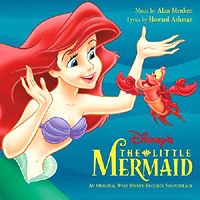 Film Soundtrack, 1989 (Disney)
Film Soundtrack, 1989 (Disney)  (4 / 5) After a decades-long dry spell, Disney film animation finally sprang to life again with The Little Mermaid, a musical adaptation of the children’s story by Hans Christian Andersen. Thanks in large part to its fantastic score by Little Shop of Horrors team Howard Ashman and Alan Menken, Mermaid single-handedly revived the animated musical. And in its main character, Ariel — a mermaid daughter of King Triton, desperate to join the human world — the film also birthed the first really spunky and smart Disney princess. As Disney has progressed to even more feminist stories and even stronger princesses, certain elements of The Little Mermaids’s plot have come under scrutiny, but the score has stood the test of time. Ashman and Menken created a charmingly magical work; Menken’s music ranges from funky calypso (“Under the Sea”) to sassy Broadway (“Poor Unfortunate Souls”), with Ashman bringing his usual touch of unpretentious intelligence to the lyrics. And the vocal cast of the film is still definitive. Best known to musical theater fans for her powerhouse vocals in Crazy For You and Smile, Jodi Benson here produces a purer, smoother, more intimate sound that allows “Part of Your World,” Ariel’s finely crafted “I Want” song, to deeply resonate with the listener. Pat Carroll, Samuel E. Wright, and René Auberjonois are wonderful in other roles, and the score is smartly but not overly lushly orchestrated by Thomas Pasatieri. — Matt Koplik
(4 / 5) After a decades-long dry spell, Disney film animation finally sprang to life again with The Little Mermaid, a musical adaptation of the children’s story by Hans Christian Andersen. Thanks in large part to its fantastic score by Little Shop of Horrors team Howard Ashman and Alan Menken, Mermaid single-handedly revived the animated musical. And in its main character, Ariel — a mermaid daughter of King Triton, desperate to join the human world — the film also birthed the first really spunky and smart Disney princess. As Disney has progressed to even more feminist stories and even stronger princesses, certain elements of The Little Mermaids’s plot have come under scrutiny, but the score has stood the test of time. Ashman and Menken created a charmingly magical work; Menken’s music ranges from funky calypso (“Under the Sea”) to sassy Broadway (“Poor Unfortunate Souls”), with Ashman bringing his usual touch of unpretentious intelligence to the lyrics. And the vocal cast of the film is still definitive. Best known to musical theater fans for her powerhouse vocals in Crazy For You and Smile, Jodi Benson here produces a purer, smoother, more intimate sound that allows “Part of Your World,” Ariel’s finely crafted “I Want” song, to deeply resonate with the listener. Pat Carroll, Samuel E. Wright, and René Auberjonois are wonderful in other roles, and the score is smartly but not overly lushly orchestrated by Thomas Pasatieri. — Matt Koplik
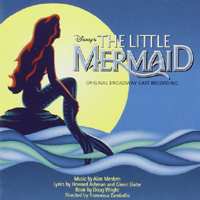 Original Broadway Cast, 2008 (Disney)
Original Broadway Cast, 2008 (Disney)  (1 / 5) Howard Ashman sadly died at the height of his career, and he never saw any of his work with Alan Menken make it to Broadway. The legacy he left behind may be relatively small, but it is substantial in quality and much beloved. When Disney brought Beauty and the Beast to the stage with financially successful results, it was only a matter of time before The Little Mermaid, the movie that started it all, would make the transition as well. Unfortunately, in this case, Disney should have left well enough alone. With Ashman gone, Glenn Slater was brought in to contribute lyrics for new songs to expand the score for a full-length stage musical, and while he managed to come up with a few good fish puns, none of his work here matches the heart and inventiveness of Ashman’s work. Menken wrote some lovely melodies for the additional songs, though some of them are recycled from incidental music heard in the movie. The cast — Sierra Boggess, Sean Palmer, Sherie Rene Scott, Tituss Burgess, Norm Lewis, et al. — is talented and, in a few cases, vocally superior to their film counterparts, but most tend to go for vocal tricks, making the majority of the score sound over-sung. While Danny Troob’s orchestrations add the necessary flashes of Broadway brass to the Menken-Ashman material without going overboard, they don’t bring as much flair to the Broadway additions. Even though this recording has more songs and offers vocal flair from some Broadway favorites, you’re better off sticking to the movie soundtrack. — M.K.
(1 / 5) Howard Ashman sadly died at the height of his career, and he never saw any of his work with Alan Menken make it to Broadway. The legacy he left behind may be relatively small, but it is substantial in quality and much beloved. When Disney brought Beauty and the Beast to the stage with financially successful results, it was only a matter of time before The Little Mermaid, the movie that started it all, would make the transition as well. Unfortunately, in this case, Disney should have left well enough alone. With Ashman gone, Glenn Slater was brought in to contribute lyrics for new songs to expand the score for a full-length stage musical, and while he managed to come up with a few good fish puns, none of his work here matches the heart and inventiveness of Ashman’s work. Menken wrote some lovely melodies for the additional songs, though some of them are recycled from incidental music heard in the movie. The cast — Sierra Boggess, Sean Palmer, Sherie Rene Scott, Tituss Burgess, Norm Lewis, et al. — is talented and, in a few cases, vocally superior to their film counterparts, but most tend to go for vocal tricks, making the majority of the score sound over-sung. While Danny Troob’s orchestrations add the necessary flashes of Broadway brass to the Menken-Ashman material without going overboard, they don’t bring as much flair to the Broadway additions. Even though this recording has more songs and offers vocal flair from some Broadway favorites, you’re better off sticking to the movie soundtrack. — M.K.
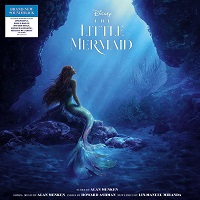 Film Soundtrack, 2023 (Walt Disney Records)
Film Soundtrack, 2023 (Walt Disney Records)  (1 / 5) Another year, another Disney remake. To be fair, the soundtrack for this “live action” adaptation of the 1989 animated classic is less bad than some of the other cinematic cash grabs that The Mouse House has made — but that still doesn’t make it “good.” From the very first track, almost all sense of fun, magic, and whimsy has been sucked out of Alan Menken’s iconic score, here polluted with overblown orchestrations and self-conscious performances. Songs such as the Oscar-winning “Under the Sea” don’t inspire nearly the same level of joy as the versions heard on the original film soundtrack recording. and while Menken is once again on hand to provide new songs for the film, with lyrics by Lin Manuel Miranda, they can’t compare to those he wrote with Howard Ashman. (The less said about “The Scuttlebutt,” the better.) On the bright side, we have the most vocally well-equipped cast of any of the Disney remakes so far. Though “Wild Uncharted Waters” isn’t much of a song, Jonah Hauer-King holds his own as Prince Eric, and if Daveed Diggs is not as bubbly and charismatic a Sebastian as Samuel E. Wright was, he at least keeps his numbers afloat. The two best performances belong to Melissa McCarthy, properly camping it up as Ursula, and Halle Bailey, who as Ariel is given numerous opportunities to showcase her wide range and crystal-clear voice. Like Sierra Boggess in the Broadway recording, Bailey sometimes over-sings her material (particularly the first half of “Part of Your World”), but her work here in general is very strong. She and McCarthy keep this otherwise unnecessary recording from being totally skippable. — M.K.
(1 / 5) Another year, another Disney remake. To be fair, the soundtrack for this “live action” adaptation of the 1989 animated classic is less bad than some of the other cinematic cash grabs that The Mouse House has made — but that still doesn’t make it “good.” From the very first track, almost all sense of fun, magic, and whimsy has been sucked out of Alan Menken’s iconic score, here polluted with overblown orchestrations and self-conscious performances. Songs such as the Oscar-winning “Under the Sea” don’t inspire nearly the same level of joy as the versions heard on the original film soundtrack recording. and while Menken is once again on hand to provide new songs for the film, with lyrics by Lin Manuel Miranda, they can’t compare to those he wrote with Howard Ashman. (The less said about “The Scuttlebutt,” the better.) On the bright side, we have the most vocally well-equipped cast of any of the Disney remakes so far. Though “Wild Uncharted Waters” isn’t much of a song, Jonah Hauer-King holds his own as Prince Eric, and if Daveed Diggs is not as bubbly and charismatic a Sebastian as Samuel E. Wright was, he at least keeps his numbers afloat. The two best performances belong to Melissa McCarthy, properly camping it up as Ursula, and Halle Bailey, who as Ariel is given numerous opportunities to showcase her wide range and crystal-clear voice. Like Sierra Boggess in the Broadway recording, Bailey sometimes over-sings her material (particularly the first half of “Part of Your World”), but her work here in general is very strong. She and McCarthy keep this otherwise unnecessary recording from being totally skippable. — M.K.
The Light in the Piazza
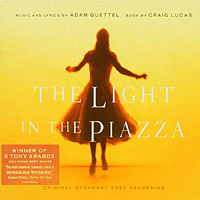 Original Broadway Cast, 2005 (Nonesuch)
Original Broadway Cast, 2005 (Nonesuch)  (5 / 5) The Light in the Piazza seemed to re-open the door for lush scores and musicals of honest sentiment of the type not seen since Rodgers and Hammerstein, at a time when modern musical theater writers were for the most part shying away from works of pure romance. Based on Elizabeth Spencer’s novel of the same title, the musical tells of Margaret Johnson, a Southern socialite, who takes her adult daughter, Clara, on vacation to Florence, Italy in the 1950s — only to have a local young man and Clara fall in love, despite Clara’s stunted mental maturity due to an accident in her childhood. For his Broadway debut, Adam Guettel wrote an overwhelmingly romantic score, rich in musical complexity and tender in its poetically precise lyrics, a fair percentage of which are in Italian in order to properly dramatize the native characters. Guettel uses the language and cultural barriers between the Johnsons and the Italians to his advantage by employing a musical language that is distinctly modern in structure, yet traditionally sweeping in sound. (Guettel and Ted Sperling are responsible for the fluid orchestrations.) Piazza is moving in its beauty, whether in its more intimate moments (“Dividing Day,” “The Beauty Is”) or its grander songs (“Il Mondo Era Vuoto,” “Say It Somehow”). The cast is exceptional, with Kelli O’Hara and Matthew Morrison providing touching, lovely performances as the two young lovers. But it’s Victoria Clark as Margaret who defines the album. Her delivery of the final song, “Fable,” in which Margaret prepares to finally let Clara go, would be reason enough to own this recording. The Light in the Piazza is a masterwork given a definitive presentation on the cast album — Matt Koplik
(5 / 5) The Light in the Piazza seemed to re-open the door for lush scores and musicals of honest sentiment of the type not seen since Rodgers and Hammerstein, at a time when modern musical theater writers were for the most part shying away from works of pure romance. Based on Elizabeth Spencer’s novel of the same title, the musical tells of Margaret Johnson, a Southern socialite, who takes her adult daughter, Clara, on vacation to Florence, Italy in the 1950s — only to have a local young man and Clara fall in love, despite Clara’s stunted mental maturity due to an accident in her childhood. For his Broadway debut, Adam Guettel wrote an overwhelmingly romantic score, rich in musical complexity and tender in its poetically precise lyrics, a fair percentage of which are in Italian in order to properly dramatize the native characters. Guettel uses the language and cultural barriers between the Johnsons and the Italians to his advantage by employing a musical language that is distinctly modern in structure, yet traditionally sweeping in sound. (Guettel and Ted Sperling are responsible for the fluid orchestrations.) Piazza is moving in its beauty, whether in its more intimate moments (“Dividing Day,” “The Beauty Is”) or its grander songs (“Il Mondo Era Vuoto,” “Say It Somehow”). The cast is exceptional, with Kelli O’Hara and Matthew Morrison providing touching, lovely performances as the two young lovers. But it’s Victoria Clark as Margaret who defines the album. Her delivery of the final song, “Fable,” in which Margaret prepares to finally let Clara go, would be reason enough to own this recording. The Light in the Piazza is a masterwork given a definitive presentation on the cast album — Matt Koplik
Memphis
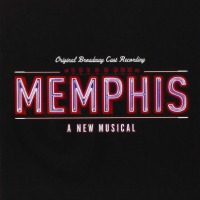 Original Broadway Cast, 2009 (Rhino)
Original Broadway Cast, 2009 (Rhino)  (3 / 5) Winner of 2010 Tony Awards for Best Musical, Book, Original Score, and Orchestrations, Memphis charts an enjoyable journey through the pioneering days of rock ‘n’ roll, when rhythm and blues morphed into a new musical genre mixing black and white influences and exciting young, integrated audiences. Set in the 1950s, when racial segregation was still the norm in much of America, the energetic musical’s plot centers around a Memphis-based, white DJ, Huey Calhoun (Chad Kimball), who is enamored of and daringly promotes African-American music. He soon falls in love with a black female singer (Montego Glover) and jump-starts her rise to stardom. Joe DiPietro’s serviceable book frames an invigorating score, with music by Bon Jovi’s David Bryan and lyrics by Bryan and DiPietro. The songs recall iconic rock performers, sounds (guitar riffs, doo-wop harmonizing, soulful blues), and hits of the period; at least three numbers sound remarkably like “Jailhouse Rock.” Yet these references are packaged within a score that’s structured Broadway-style, featuring dramatic solos enhanced by solid ensemble singing, colorful orchestrations, wordy (sometimes overly so) lyrics, and infectious dance breaks. The cast album highlights come at the beginning and the end. The opening jump blues number, “Underground,” is followed by the searing ballad “The Music of My Soul,” and these songs let us know we’re in for a rebellious ride through rough racial terrain, while the catchy “Everybody Wants to Be Black on a Saturday Night” gets us gleefully on board. Heightening the show’s bittersweet climax, when the lovers part, “Memphis Lives in Me” salutes Huey’s hometown and all it represents emotionally, culturally, and musically. The upbeat finale, “Steal Your Rock ‘n’ Roll,” exemplifies the score’s accessible if unimaginative blend of pop appeal, Broadway pizzazz, and early rock sensibilities. Throughout, Kimball sings Huey’s songs with scratchy grit and raw expressiveness; his superb acting contributed immeasurably to the musical’s success on Broadway. As Felicia, the singer who captures Huey’s heart, Glover offers dramatically nuanced versions of the showpieces “Colored Woman” and “Love Will Stand When All Else Fails.” — Lisa Jo Sagolla
(3 / 5) Winner of 2010 Tony Awards for Best Musical, Book, Original Score, and Orchestrations, Memphis charts an enjoyable journey through the pioneering days of rock ‘n’ roll, when rhythm and blues morphed into a new musical genre mixing black and white influences and exciting young, integrated audiences. Set in the 1950s, when racial segregation was still the norm in much of America, the energetic musical’s plot centers around a Memphis-based, white DJ, Huey Calhoun (Chad Kimball), who is enamored of and daringly promotes African-American music. He soon falls in love with a black female singer (Montego Glover) and jump-starts her rise to stardom. Joe DiPietro’s serviceable book frames an invigorating score, with music by Bon Jovi’s David Bryan and lyrics by Bryan and DiPietro. The songs recall iconic rock performers, sounds (guitar riffs, doo-wop harmonizing, soulful blues), and hits of the period; at least three numbers sound remarkably like “Jailhouse Rock.” Yet these references are packaged within a score that’s structured Broadway-style, featuring dramatic solos enhanced by solid ensemble singing, colorful orchestrations, wordy (sometimes overly so) lyrics, and infectious dance breaks. The cast album highlights come at the beginning and the end. The opening jump blues number, “Underground,” is followed by the searing ballad “The Music of My Soul,” and these songs let us know we’re in for a rebellious ride through rough racial terrain, while the catchy “Everybody Wants to Be Black on a Saturday Night” gets us gleefully on board. Heightening the show’s bittersweet climax, when the lovers part, “Memphis Lives in Me” salutes Huey’s hometown and all it represents emotionally, culturally, and musically. The upbeat finale, “Steal Your Rock ‘n’ Roll,” exemplifies the score’s accessible if unimaginative blend of pop appeal, Broadway pizzazz, and early rock sensibilities. Throughout, Kimball sings Huey’s songs with scratchy grit and raw expressiveness; his superb acting contributed immeasurably to the musical’s success on Broadway. As Felicia, the singer who captures Huey’s heart, Glover offers dramatically nuanced versions of the showpieces “Colored Woman” and “Love Will Stand When All Else Fails.” — Lisa Jo Sagolla
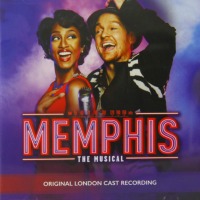 Original London Cast, 2015 (First Night)
Original London Cast, 2015 (First Night)  (3 / 5) Five years after it opened on Broadway, Memphis played for a year on London’s West End. Though one can detect slight differences in the arrangements, orchestrations, and tempi of several songs, the only significant dissimilarities between the Broadway and London cast albums lie in the singing of the lead performers. As Huey, a character loosely inspired by the trailblazing, Memphis-based, white DJ Dewey Phillips (who championed black music), Killian Donnelly offers smoother, prettier, more technically polished singing than Chad Kimball in his renditions of the heartfelt “The Music of My Soul” and “Memphis Lives in Me,” as well as the wild “Crazy Little Huey.” Beverley Knight sings Felicia’s songs with greater authority than Montego Glover, perhaps too much authority for the vulnerable character. Overall, the Broadway album proves more effective as theater music; there’s more variety among the vocal qualities of the cast members, so their characters come through with greater distinction. “She’s My Sister,” a heated duet between Huey and Felicia’s brother, generates less tension on the London album and is harder to follow because the performers’ voices don’t contrast as forcefully as do those of their Broadway counterparts. But whereas the Broadway album offers a superfluous bonus track of Memphis composer/co-lyricist David Bryan singing “The Music of My Soul” over his own too-loud piano accompaniment, the London recording’s bonus is an impressive performance by Bryan of “Memphis Lives in Me.” — L.J.S.
(3 / 5) Five years after it opened on Broadway, Memphis played for a year on London’s West End. Though one can detect slight differences in the arrangements, orchestrations, and tempi of several songs, the only significant dissimilarities between the Broadway and London cast albums lie in the singing of the lead performers. As Huey, a character loosely inspired by the trailblazing, Memphis-based, white DJ Dewey Phillips (who championed black music), Killian Donnelly offers smoother, prettier, more technically polished singing than Chad Kimball in his renditions of the heartfelt “The Music of My Soul” and “Memphis Lives in Me,” as well as the wild “Crazy Little Huey.” Beverley Knight sings Felicia’s songs with greater authority than Montego Glover, perhaps too much authority for the vulnerable character. Overall, the Broadway album proves more effective as theater music; there’s more variety among the vocal qualities of the cast members, so their characters come through with greater distinction. “She’s My Sister,” a heated duet between Huey and Felicia’s brother, generates less tension on the London album and is harder to follow because the performers’ voices don’t contrast as forcefully as do those of their Broadway counterparts. But whereas the Broadway album offers a superfluous bonus track of Memphis composer/co-lyricist David Bryan singing “The Music of My Soul” over his own too-loud piano accompaniment, the London recording’s bonus is an impressive performance by Bryan of “Memphis Lives in Me.” — L.J.S.
Matilda
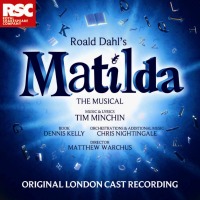 Original London Cast, 2013 (RSC)
Original London Cast, 2013 (RSC)  (5 / 5) This recording reflects the Royal Shakespeare Company’s world premiere production of the musical Matilda, based on Roald Dahl’s book about a precocious, five-year-old British girl. A rather dark, cerebral show that also happens to be wickedly funny, charming, and moving, Matilda is in some ways the antidote to Annie; whereas the redheaded orphan patiently waited for the sun to come out tomorrow, Matilda fights to change her life and the bad deck of cards she has been dealt, including a moronic family that doesn’t care about her and a fearsome headmistress who hates children in general. For his first musical theater work, Australian comedian Tim Minchin has written a stellar score, one with playfully odd melodies and deliciously smart lyrics that fit the wonderfully twisted world of Dahl perfectly. There’s much fun to be had in “Naughty,” “Telly,” and other songs; and when Matilda shows its heart, it thankfully doesn’t wear it on its sleeve like so many children-centered shows. Songs such as “Quiet” and “My House” are simple and understated (a rarity in modern musical theater), allowing the actors to live in them and explore their dramatic potential. Christopher Nightingale’s orchestrations are by turns playful (“Miracle”), funky (“Revolting Children”), and beautiful (“I’m Here”). The cast of this recording is wonderful, with three young performers covering different tracks of Matilda (because they rotated in the role on stage). Special praise goes to Bertie Carvel, who plays the headmistress, Miss Trunchbull. Avoiding camp, Carvel instead performs like a dry, British piranha, making the character’s evilness funny yet still menacing. Perhaps the greatest song on this album is “When I Grow Up, ” by far the most uplifting number in the score: “When I grow up / I will be brave enough to fight the creatures / That you have to fight beneath the bed / Each night to be a grown up.” It reveals that, for all its cleverness and mischief, Matilda is at its core an optimistic show. — Matt Koplik
(5 / 5) This recording reflects the Royal Shakespeare Company’s world premiere production of the musical Matilda, based on Roald Dahl’s book about a precocious, five-year-old British girl. A rather dark, cerebral show that also happens to be wickedly funny, charming, and moving, Matilda is in some ways the antidote to Annie; whereas the redheaded orphan patiently waited for the sun to come out tomorrow, Matilda fights to change her life and the bad deck of cards she has been dealt, including a moronic family that doesn’t care about her and a fearsome headmistress who hates children in general. For his first musical theater work, Australian comedian Tim Minchin has written a stellar score, one with playfully odd melodies and deliciously smart lyrics that fit the wonderfully twisted world of Dahl perfectly. There’s much fun to be had in “Naughty,” “Telly,” and other songs; and when Matilda shows its heart, it thankfully doesn’t wear it on its sleeve like so many children-centered shows. Songs such as “Quiet” and “My House” are simple and understated (a rarity in modern musical theater), allowing the actors to live in them and explore their dramatic potential. Christopher Nightingale’s orchestrations are by turns playful (“Miracle”), funky (“Revolting Children”), and beautiful (“I’m Here”). The cast of this recording is wonderful, with three young performers covering different tracks of Matilda (because they rotated in the role on stage). Special praise goes to Bertie Carvel, who plays the headmistress, Miss Trunchbull. Avoiding camp, Carvel instead performs like a dry, British piranha, making the character’s evilness funny yet still menacing. Perhaps the greatest song on this album is “When I Grow Up, ” by far the most uplifting number in the score: “When I grow up / I will be brave enough to fight the creatures / That you have to fight beneath the bed / Each night to be a grown up.” It reveals that, for all its cleverness and mischief, Matilda is at its core an optimistic show. — Matt Koplik
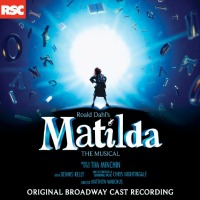 Original Broadway Cast, 2013 (Yellow Sound Label/Broadway Records)
Original Broadway Cast, 2013 (Yellow Sound Label/Broadway Records)  (3 / 5) Here we have a rare situation: a London cast album is actually preferable to the recording of the Broadway incarnation. While all of the new performers are as talented as their predecessors, and much is the same in terms of material (there is more dialogue included on the OBC recording, and there are some minor lyric changes), something is slightly off here. In trying to “Broadway-ize” the piece, Matilda’s creators made the show a difficult listening experience. Perhaps the biggest problem is/are the new orchestrations by Christopher Nightingale; brassy and brash, they frequently overpower the singers (even on the recording), making it hard to understand Minchin’s brilliant lyrics. Perhaps to compete with the orchestra, the performances of this cast are broader and less human than those of the British company. Even Bertie Carvel, repeating his role of Miss Trunchball, seems less funny and more fidgety than before. On the bright side, Lauren Ward as Miss Honey, also returning from the London production, is just as touching and perhaps even stronger vocally than on the previous recording. She is the sole caring adult character, and the beating heart of the show. All of the Matildas here — four of them, as opposed to the British three — are smart actresses and talented singers. Thankfully, for their tracks, Nightingale chose to remain faithful to his original orchestrations. — M.K.
(3 / 5) Here we have a rare situation: a London cast album is actually preferable to the recording of the Broadway incarnation. While all of the new performers are as talented as their predecessors, and much is the same in terms of material (there is more dialogue included on the OBC recording, and there are some minor lyric changes), something is slightly off here. In trying to “Broadway-ize” the piece, Matilda’s creators made the show a difficult listening experience. Perhaps the biggest problem is/are the new orchestrations by Christopher Nightingale; brassy and brash, they frequently overpower the singers (even on the recording), making it hard to understand Minchin’s brilliant lyrics. Perhaps to compete with the orchestra, the performances of this cast are broader and less human than those of the British company. Even Bertie Carvel, repeating his role of Miss Trunchball, seems less funny and more fidgety than before. On the bright side, Lauren Ward as Miss Honey, also returning from the London production, is just as touching and perhaps even stronger vocally than on the previous recording. She is the sole caring adult character, and the beating heart of the show. All of the Matildas here — four of them, as opposed to the British three — are smart actresses and talented singers. Thankfully, for their tracks, Nightingale chose to remain faithful to his original orchestrations. — M.K.
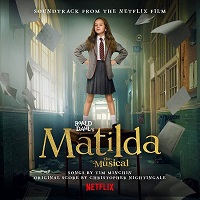 Film Soundtrack, 2022 (Masterworks Broadway)
Film Soundtrack, 2022 (Masterworks Broadway)  (4 / 5) When Matilda was being developed as a film, the entire original creative team was brought on to head the adaptation, which turned out well. Extremely well. As evidenced by this soundtrack album, Roald Dahl’s Matilda The Musical — the official title given to the movie by its distributor, Netflix — is just as sweet, edgy and unapologetically weird as the stage version. Christopher Nightingale has expanded his original orchestrations, and this recording is mixed in such a way that those orchestrations are not overwhelming, as they sometimes are on the Broadway cast album. Also, a much larger chorus of child actors bolsters major ensemble numbers such as “When I Grow Up” and “Revolting Children.” Since this is a movie with no rigorous, eight-shows-a-week performance schedule, only one actress is called on for the title role: 11-year-old Alisha Weir, who displays a perfect balance of precociousness and innocence as Matilda. In a departure from the stage version’s British panto approach to the character Trunchbull, Emma Thompson has stepped into the evil headmistress’ shoes. More overtly menacing than Bertie Carvel, Thompson appears game for anything and throws herself into the role, giving “The Hammer” and “The Smell of Rebellion” the proper mix of danger and hilarity that they require. Lashana Lynch is a lovely Miss Honey, making the most of “My House” and “Still Holding My Hand,” an effective new finale that Tim Minchin wrote for the film as a duet between Miss Honey and Matilda. There are some minor gripes with this recording: Though the cutting of the songs “Loud” and “Telly” isn’t an offensive choice, Andrea Riseborough and Stephen Graham make such a strong impression as Matilda’s horrible parents in “Miracle” that one wishes they had more opportunities to shine. And while the soundtrack includes the music for each of Matilda’s chapters on the Acrobat and Escapologist story, for some reason it doesn’t include any of Weir’s narration — a mistake, as the tracks now play more like background music than theatrical storytelling. So in order to hear Weir’s charming performance of these stories, you’ll have to watch the movie, which isn’t a hardship by any means. — M.K.
(4 / 5) When Matilda was being developed as a film, the entire original creative team was brought on to head the adaptation, which turned out well. Extremely well. As evidenced by this soundtrack album, Roald Dahl’s Matilda The Musical — the official title given to the movie by its distributor, Netflix — is just as sweet, edgy and unapologetically weird as the stage version. Christopher Nightingale has expanded his original orchestrations, and this recording is mixed in such a way that those orchestrations are not overwhelming, as they sometimes are on the Broadway cast album. Also, a much larger chorus of child actors bolsters major ensemble numbers such as “When I Grow Up” and “Revolting Children.” Since this is a movie with no rigorous, eight-shows-a-week performance schedule, only one actress is called on for the title role: 11-year-old Alisha Weir, who displays a perfect balance of precociousness and innocence as Matilda. In a departure from the stage version’s British panto approach to the character Trunchbull, Emma Thompson has stepped into the evil headmistress’ shoes. More overtly menacing than Bertie Carvel, Thompson appears game for anything and throws herself into the role, giving “The Hammer” and “The Smell of Rebellion” the proper mix of danger and hilarity that they require. Lashana Lynch is a lovely Miss Honey, making the most of “My House” and “Still Holding My Hand,” an effective new finale that Tim Minchin wrote for the film as a duet between Miss Honey and Matilda. There are some minor gripes with this recording: Though the cutting of the songs “Loud” and “Telly” isn’t an offensive choice, Andrea Riseborough and Stephen Graham make such a strong impression as Matilda’s horrible parents in “Miracle” that one wishes they had more opportunities to shine. And while the soundtrack includes the music for each of Matilda’s chapters on the Acrobat and Escapologist story, for some reason it doesn’t include any of Weir’s narration — a mistake, as the tracks now play more like background music than theatrical storytelling. So in order to hear Weir’s charming performance of these stories, you’ll have to watch the movie, which isn’t a hardship by any means. — M.K.
The Last Ship
 Studio Cast, 2013 (Cherrytree/A&M)
Studio Cast, 2013 (Cherrytree/A&M)  (4 / 5) Rock icon Sting introduced most of the songs that would fuel his Broadway musical The Last Ship in this eponymous, 12-track concept album, released a year before the show premiered. (A deluxe version featured five additional songs, while a super-deluxe edition comprising 20 tracks was made available exclusively through Amazon.) The first recording of original music that Sting had released in a decade, The Last Ship proffers heartfelt, Celtic-flavored songs inspired by his youth in a shipyard town in northern England. The 16-time Grammy-winning singer-songwriter appealingly intermingles pop, rock, jazz, and world music — and, in this outing, draws particularly from Northumbrian folk forms and Latin dance rhythms. While each song is musically enchanting, Sting performs them all himself, lending a lulling sameness to the recording’s vocal palette; the deluxe editions fare better in this regard, as they involve additional singers and a wider array of accompanying instruments. Fans of Sting the rocker will thrill to the deluxe version’s addition of “Jock the Singing Welder,” a raw, rockabilly tune that didn’t make it into the Broadway musical. But it’s Sting the balladeer who shines brightest in the original 12 tracks. He persuasively captures the righteousness of an angry young man relating the tale of “Dead Man’s Boots,” and his renditions of the poignant “I Love Her But She Loves Someone Else” and “Practical Arrangement” (which also didn’t make it to Broadway) are especially piercing. “Show Some Respect” sounds like it came straight out of The Threepenny Opera, and the stirring title song and “What Have We Got?” seem promising fodder for Broadway production numbers. However, it’s the entertaining qualities of the lively waltz-time ditty “The Night the Pugilist Learned How to Dance” that most blatantly marks this recording as an album of Broadway-bound material. — Lisa Jo Sagolla
(4 / 5) Rock icon Sting introduced most of the songs that would fuel his Broadway musical The Last Ship in this eponymous, 12-track concept album, released a year before the show premiered. (A deluxe version featured five additional songs, while a super-deluxe edition comprising 20 tracks was made available exclusively through Amazon.) The first recording of original music that Sting had released in a decade, The Last Ship proffers heartfelt, Celtic-flavored songs inspired by his youth in a shipyard town in northern England. The 16-time Grammy-winning singer-songwriter appealingly intermingles pop, rock, jazz, and world music — and, in this outing, draws particularly from Northumbrian folk forms and Latin dance rhythms. While each song is musically enchanting, Sting performs them all himself, lending a lulling sameness to the recording’s vocal palette; the deluxe editions fare better in this regard, as they involve additional singers and a wider array of accompanying instruments. Fans of Sting the rocker will thrill to the deluxe version’s addition of “Jock the Singing Welder,” a raw, rockabilly tune that didn’t make it into the Broadway musical. But it’s Sting the balladeer who shines brightest in the original 12 tracks. He persuasively captures the righteousness of an angry young man relating the tale of “Dead Man’s Boots,” and his renditions of the poignant “I Love Her But She Loves Someone Else” and “Practical Arrangement” (which also didn’t make it to Broadway) are especially piercing. “Show Some Respect” sounds like it came straight out of The Threepenny Opera, and the stirring title song and “What Have We Got?” seem promising fodder for Broadway production numbers. However, it’s the entertaining qualities of the lively waltz-time ditty “The Night the Pugilist Learned How to Dance” that most blatantly marks this recording as an album of Broadway-bound material. — Lisa Jo Sagolla
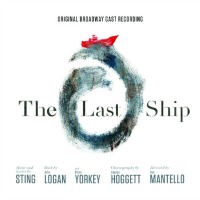 Original Broadway Cast, 2014 (Universal)
Original Broadway Cast, 2014 (Universal)  (5 / 5) Featuring wonderfully earthy, Celtic-inflected music and lyrics by Sting, The Last Ship is marred only by John Logan and Brian Yorkey’s unimaginative book, its parable-like plot and melodramatic ending providing clichéd framing for the touching songs. The show explores a working-class community’s struggles upon the closing of the shipyard that provided not only its financial lifeline, but also its people’s sense of self-worth. The central character, Gideon, had left town years earlier; he comes home to discover he has a son, reigniting deep-seated conflicts concerning father-son relationships, romantic love, and self-fulfillment. Pulling three songs from his career as a solo musician, Sting’s score is more theatrically successful than one might expect from a pop artist. The title tune’s swaying, triple-meter pulse recalls the rocking of a ship on ocean waves with anthem-like grandeur. “Shipyard” mixes Gilbert & Sullivan-esque verses with raucous, Irish dance music, conveying battles between old rules and new revolutionary fervor. Enriched immeasurably by Rob Mathes’s music direction, orchestrations, and arrangements, the Broadway cast album proves more entertaining than the concept recording, which was performed largely by Sting. The haunting “August Winds” sits better in the voice of Rachel Tucker (who plays Gideon’s love interest, Meg), making her hopeful version of it easier on the ears than Sting’s mournful one. As Gideon’s competitor for Meg’s love, Aaron Lazar sings the memorable “What Say You, Meg?” with a silkiness preferable to Sting’s rawer sound. Every track on the album is winning, none more so than “If You Ever See Me Talking to a Sailor.” A range-y showpiece with character-revealing lyrics set to sexy ethnic rhythms, it exemplifies Sting’s achievement in crafting a well-functioning musical theater score out of songs so specifically rooted in his personal experience. — L.J.S.
(5 / 5) Featuring wonderfully earthy, Celtic-inflected music and lyrics by Sting, The Last Ship is marred only by John Logan and Brian Yorkey’s unimaginative book, its parable-like plot and melodramatic ending providing clichéd framing for the touching songs. The show explores a working-class community’s struggles upon the closing of the shipyard that provided not only its financial lifeline, but also its people’s sense of self-worth. The central character, Gideon, had left town years earlier; he comes home to discover he has a son, reigniting deep-seated conflicts concerning father-son relationships, romantic love, and self-fulfillment. Pulling three songs from his career as a solo musician, Sting’s score is more theatrically successful than one might expect from a pop artist. The title tune’s swaying, triple-meter pulse recalls the rocking of a ship on ocean waves with anthem-like grandeur. “Shipyard” mixes Gilbert & Sullivan-esque verses with raucous, Irish dance music, conveying battles between old rules and new revolutionary fervor. Enriched immeasurably by Rob Mathes’s music direction, orchestrations, and arrangements, the Broadway cast album proves more entertaining than the concept recording, which was performed largely by Sting. The haunting “August Winds” sits better in the voice of Rachel Tucker (who plays Gideon’s love interest, Meg), making her hopeful version of it easier on the ears than Sting’s mournful one. As Gideon’s competitor for Meg’s love, Aaron Lazar sings the memorable “What Say You, Meg?” with a silkiness preferable to Sting’s rawer sound. Every track on the album is winning, none more so than “If You Ever See Me Talking to a Sailor.” A range-y showpiece with character-revealing lyrics set to sexy ethnic rhythms, it exemplifies Sting’s achievement in crafting a well-functioning musical theater score out of songs so specifically rooted in his personal experience. — L.J.S.
Myths and Hymn (Saturn Returns)
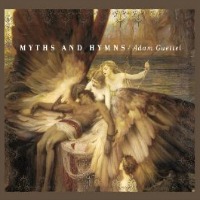 Studio Cast, 1999 (Nonesuch)
Studio Cast, 1999 (Nonesuch)  (4 / 5) Composer-lyricist Adam Guettel’s song cycle Saturn Returns had a brief run at The Public Theater but never got an original cast album. Myths and Hymns comes pretty close, as this recording contains most of the show’s songs (which include additional lyrics by Ellen Fitzhugh) and features the original cast joined by three more wonderful performers: Billy Porter, Audra McDonald, and the dulcet-toned composer himself. The album delivers what the title promises, offering Guettel’s unique perspectives on Greek myths, musical settings of obscure hymnal lyrics, and original hymns. Most of the mythic songs are humorous, modern psychological deconstructions of such legends as the one about Icarus, while the hymns capture both the optimism and anguish of spiritual belief; listen to Porter’s fiery “Awaiting You” for the best example of the latter. One of the most striking pieces concerns an abortion. The style of composition varies greatly, from the funky electronics of “Icarus” to the joyful gospel sound of “There’s a Shout,” the angular “Children of the Heavenly King,” and the soaring “Migratory V.” “Hero and Leander” is a ravishing romantic ballad, and even more compelling is “Saturn Returns,” a musical monologue in which the composer laments: “I don’t know what I hunger for, I only know I feel the hunger more and more with every passing day.” — Brooke Pierce
(4 / 5) Composer-lyricist Adam Guettel’s song cycle Saturn Returns had a brief run at The Public Theater but never got an original cast album. Myths and Hymns comes pretty close, as this recording contains most of the show’s songs (which include additional lyrics by Ellen Fitzhugh) and features the original cast joined by three more wonderful performers: Billy Porter, Audra McDonald, and the dulcet-toned composer himself. The album delivers what the title promises, offering Guettel’s unique perspectives on Greek myths, musical settings of obscure hymnal lyrics, and original hymns. Most of the mythic songs are humorous, modern psychological deconstructions of such legends as the one about Icarus, while the hymns capture both the optimism and anguish of spiritual belief; listen to Porter’s fiery “Awaiting You” for the best example of the latter. One of the most striking pieces concerns an abortion. The style of composition varies greatly, from the funky electronics of “Icarus” to the joyful gospel sound of “There’s a Shout,” the angular “Children of the Heavenly King,” and the soaring “Migratory V.” “Hero and Leander” is a ravishing romantic ballad, and even more compelling is “Saturn Returns,” a musical monologue in which the composer laments: “I don’t know what I hunger for, I only know I feel the hunger more and more with every passing day.” — Brooke Pierce
The Mystery of Edwin Drood
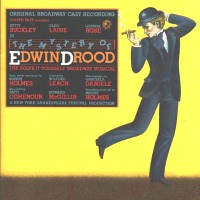 Original Cast, 1986 (Polydor/Varèse Sarabande/Verve)
Original Cast, 1986 (Polydor/Varèse Sarabande/Verve)  (3 / 5) Composer-lyricist-Iibrettist Rupert Holmes folded a tribute to the English music hall into his adaptation of Charles Dickens’ unfinished novel The Mystery of Edwin Drood, and he came up with an intriguing musical whodunit. The original cast, as preserved here, is exemplary; it includes the great George Rose and the one-of-a-kind Cleo Laine, along with heavy-hitting Broadway pros Howard McGillin, Patti Cohenour, Judy Kuhn, Donna Murphy, and belter extraordinaire Betty Buckley in the title role. “The Wages of Sin” is a specialty number delivered stylishly by Laine, and the haunting “Moonfall” is beautifully rendered by Cohenour. Other standouts are the boisterous opening number, “There You Are”; the breathless “Both Sides of the Coin”; the exciting “Don’t Quit While You’re Ahead”; and the finale, “The Writing on the Wall.” This show’s peculiar distinction is that it allowed audiences to vote on how the plot should conclude. The two separate CD editions of the cast recording offer varying material in regard to those choices, and the Varèse reinstates “Ceylon” and the “Moonfall” quartet, which are not on the Polydor disc. But all of the tracks are available in mp3 format. — Matthew Murray
(3 / 5) Composer-lyricist-Iibrettist Rupert Holmes folded a tribute to the English music hall into his adaptation of Charles Dickens’ unfinished novel The Mystery of Edwin Drood, and he came up with an intriguing musical whodunit. The original cast, as preserved here, is exemplary; it includes the great George Rose and the one-of-a-kind Cleo Laine, along with heavy-hitting Broadway pros Howard McGillin, Patti Cohenour, Judy Kuhn, Donna Murphy, and belter extraordinaire Betty Buckley in the title role. “The Wages of Sin” is a specialty number delivered stylishly by Laine, and the haunting “Moonfall” is beautifully rendered by Cohenour. Other standouts are the boisterous opening number, “There You Are”; the breathless “Both Sides of the Coin”; the exciting “Don’t Quit While You’re Ahead”; and the finale, “The Writing on the Wall.” This show’s peculiar distinction is that it allowed audiences to vote on how the plot should conclude. The two separate CD editions of the cast recording offer varying material in regard to those choices, and the Varèse reinstates “Ceylon” and the “Moonfall” quartet, which are not on the Polydor disc. But all of the tracks are available in mp3 format. — Matthew Murray
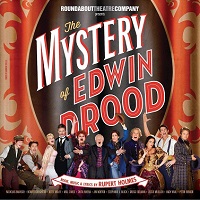 Broadway Cast, 2013 (DRG)
Broadway Cast, 2013 (DRG)  (5 / 5) This is one of the most exuberant cast albums out there. From the exhilarating opening address to the audience, “There You Are,” through to the final high-vaulted chords of “The Writing On the Wall,” there’s a palpable sense that the whole cast — and even the orchestra — are having endless fun scampering over the dexterously, densely written landscape of Rupert Holmes’ score. With The Mystery of Edwin Drood, Holmes proved himself a quadruple threat, having written the show’s music, book, lyrics, and orchestrations. Part of the infectious energy of this Broadway revival cast album comes from the way the cast leans into the show-within-a-show framework; they’re all portraying English music hall actors putting on a production of Drood, so everyone heightens but only slightly hams up their performances. And what performances they are: Will Chase as a terrifying John Jasper, chomping at the bit with lunacy and lust; Betsy Wolfe, adding an edge to the silver-voiced Rosa Bud; Jessie Mueller, stealing the show with delicious venom as Helena; the extraordinary Stephanie J. Block, whose belt has never been put to better use, leading the company in the title role. And even though Broadway icon Chita Rivera is given the score’s least compelling pair of songs, she shines with affectionate raunchiness as the madam, Princess Puffer. This Drood is at its best when the cast members team up for duets such as “Perfect Strangers” and “The Name of Love”/“Moonlight Reprise,” or ensemble moments in “No Good Can Come From Mad” and the stunning “Moonlight Quartet.” Departing from the 1986 recording, the revival album includes the rich instrumental “Opium Den Ballet” plus a new second act opener, “An English Music Hall,” and a freshly-conceived version of “Ceylon”/“A British Subject” that erupts into Holmes’ distinctively opulent counterpoint. (The music hall context lets Mueller and Andy Karl get away with caricatured accents that would otherwise come across as offensive). As for the show’s alternative endings, this album smartly reduces the Detective Datchery reveals to two tracks, keeps in all eight murderers’ confessions, and adds a clever album-only mashup of the possible pairs of lovers. A final note of praise is that the recording is gorgeously mixed; you can understand every word of Holmes’ tangly text, and individual instruments (especially in the reed section) feel like characters themselves. — Dan Rubins
(5 / 5) This is one of the most exuberant cast albums out there. From the exhilarating opening address to the audience, “There You Are,” through to the final high-vaulted chords of “The Writing On the Wall,” there’s a palpable sense that the whole cast — and even the orchestra — are having endless fun scampering over the dexterously, densely written landscape of Rupert Holmes’ score. With The Mystery of Edwin Drood, Holmes proved himself a quadruple threat, having written the show’s music, book, lyrics, and orchestrations. Part of the infectious energy of this Broadway revival cast album comes from the way the cast leans into the show-within-a-show framework; they’re all portraying English music hall actors putting on a production of Drood, so everyone heightens but only slightly hams up their performances. And what performances they are: Will Chase as a terrifying John Jasper, chomping at the bit with lunacy and lust; Betsy Wolfe, adding an edge to the silver-voiced Rosa Bud; Jessie Mueller, stealing the show with delicious venom as Helena; the extraordinary Stephanie J. Block, whose belt has never been put to better use, leading the company in the title role. And even though Broadway icon Chita Rivera is given the score’s least compelling pair of songs, she shines with affectionate raunchiness as the madam, Princess Puffer. This Drood is at its best when the cast members team up for duets such as “Perfect Strangers” and “The Name of Love”/“Moonlight Reprise,” or ensemble moments in “No Good Can Come From Mad” and the stunning “Moonlight Quartet.” Departing from the 1986 recording, the revival album includes the rich instrumental “Opium Den Ballet” plus a new second act opener, “An English Music Hall,” and a freshly-conceived version of “Ceylon”/“A British Subject” that erupts into Holmes’ distinctively opulent counterpoint. (The music hall context lets Mueller and Andy Karl get away with caricatured accents that would otherwise come across as offensive). As for the show’s alternative endings, this album smartly reduces the Detective Datchery reveals to two tracks, keeps in all eight murderers’ confessions, and adds a clever album-only mashup of the possible pairs of lovers. A final note of praise is that the recording is gorgeously mixed; you can understand every word of Holmes’ tangly text, and individual instruments (especially in the reed section) feel like characters themselves. — Dan Rubins
My One and Only
 Original Broadway Cast, 1983 (Atlantic)
Original Broadway Cast, 1983 (Atlantic)  (3 / 5) This “new” musical was written around old George and Ira Gershwin songs. During its troubled pre-Broadway tryout, book writer Peter Stone and the uncredited Mike Nichols oversaw an extensive reworking of the show, with star Tommy Tune taking over as director. They surprised everybody by pulling it off; by the time My One and Only reached New York, it was delightful. The cast album is not a fully accurate representation of the production, which was much more fluid than this recording suggests, with witty dance numbers popping up from the ensemble as well as the stars. (This is the show in which Twiggy and Tommy Tune tap-danced in water during “S Wonderful.”) Several songs have been left off the album, including the chorus number “Just Another Rhumba.” A more serious omission is dancer Honi Coles’ big first-act showcase, “High Hat” — a skillful weave of dialogue, singing, and dance that was inexplicably replaced on the recording by a straightforward version of “Sweet and Lowdown.” On the other hand, Twiggy and Tune are heard duetting in “Little Jazz Bird,” even though that number was cut from the show. Throughout, the stars are charming, and the music and lyrics incomparable. A partial list of highlights: “I Can’t Be Bothered Now,” “Boy Wanted,” “Soon,” “He Loves and She Loves,” “How Long Has This Been Going On?” and, of course, the fabulous title song. — David Wolf
(3 / 5) This “new” musical was written around old George and Ira Gershwin songs. During its troubled pre-Broadway tryout, book writer Peter Stone and the uncredited Mike Nichols oversaw an extensive reworking of the show, with star Tommy Tune taking over as director. They surprised everybody by pulling it off; by the time My One and Only reached New York, it was delightful. The cast album is not a fully accurate representation of the production, which was much more fluid than this recording suggests, with witty dance numbers popping up from the ensemble as well as the stars. (This is the show in which Twiggy and Tommy Tune tap-danced in water during “S Wonderful.”) Several songs have been left off the album, including the chorus number “Just Another Rhumba.” A more serious omission is dancer Honi Coles’ big first-act showcase, “High Hat” — a skillful weave of dialogue, singing, and dance that was inexplicably replaced on the recording by a straightforward version of “Sweet and Lowdown.” On the other hand, Twiggy and Tune are heard duetting in “Little Jazz Bird,” even though that number was cut from the show. Throughout, the stars are charming, and the music and lyrics incomparable. A partial list of highlights: “I Can’t Be Bothered Now,” “Boy Wanted,” “Soon,” “He Loves and She Loves,” “How Long Has This Been Going On?” and, of course, the fabulous title song. — David Wolf

